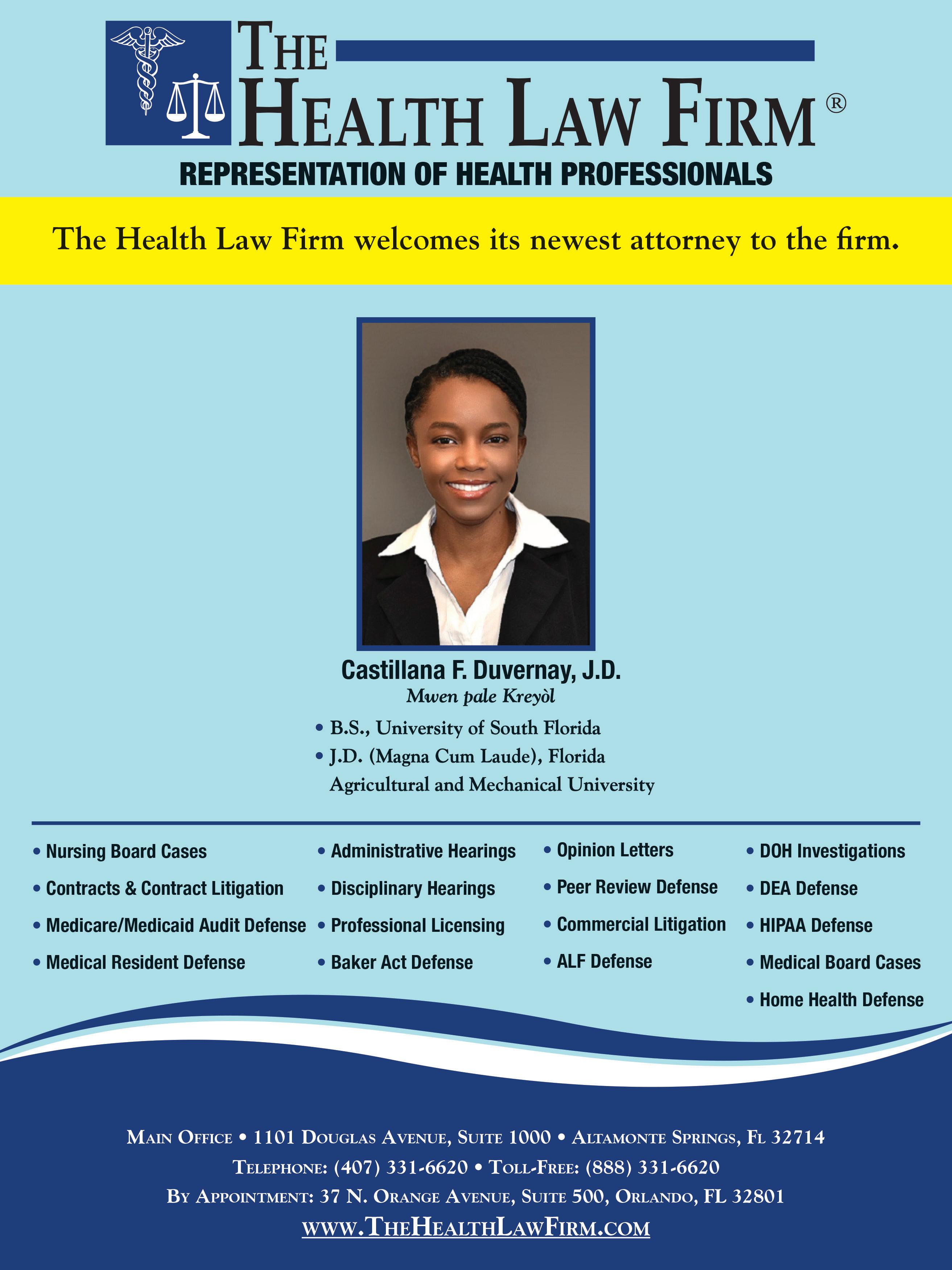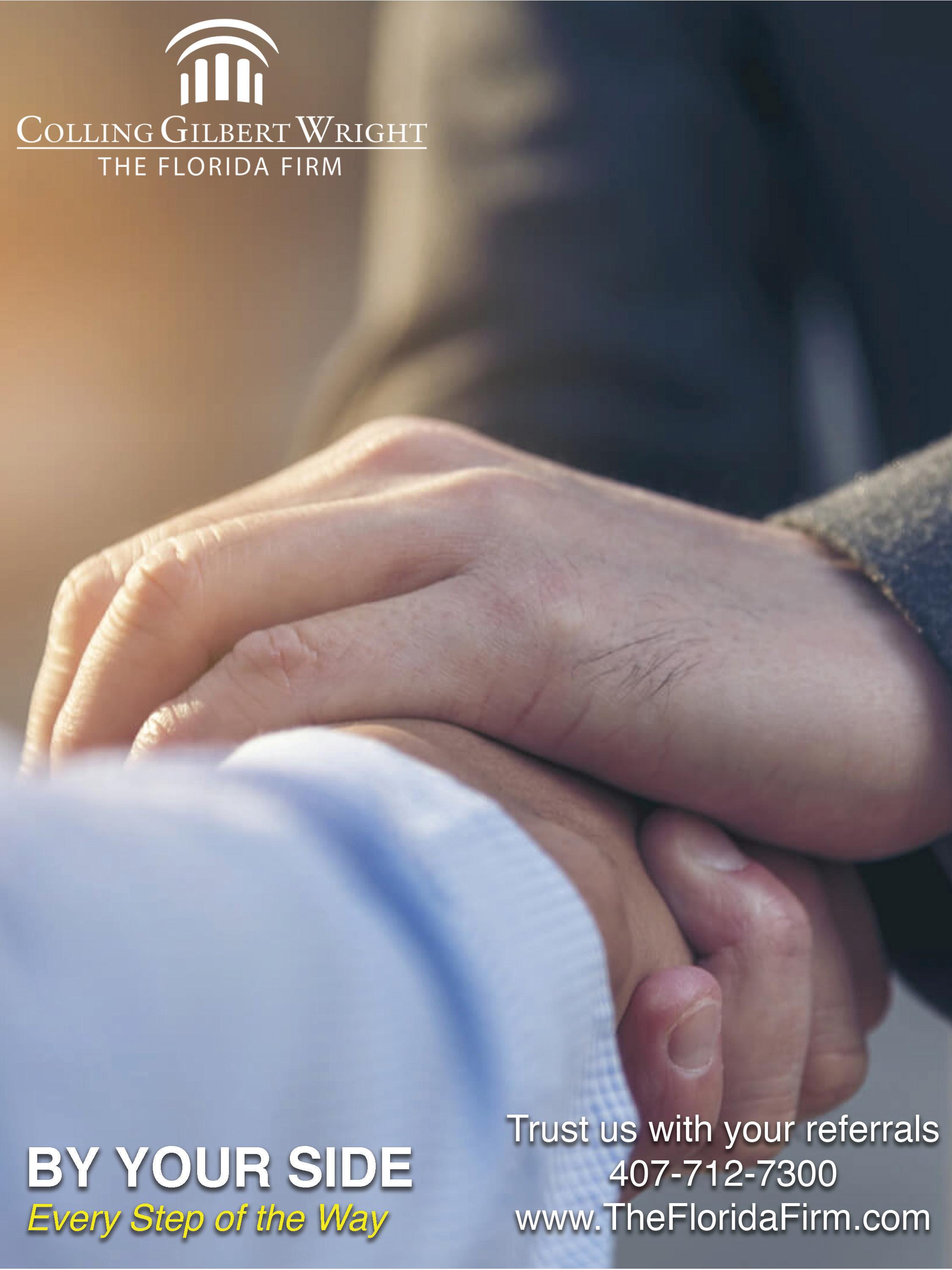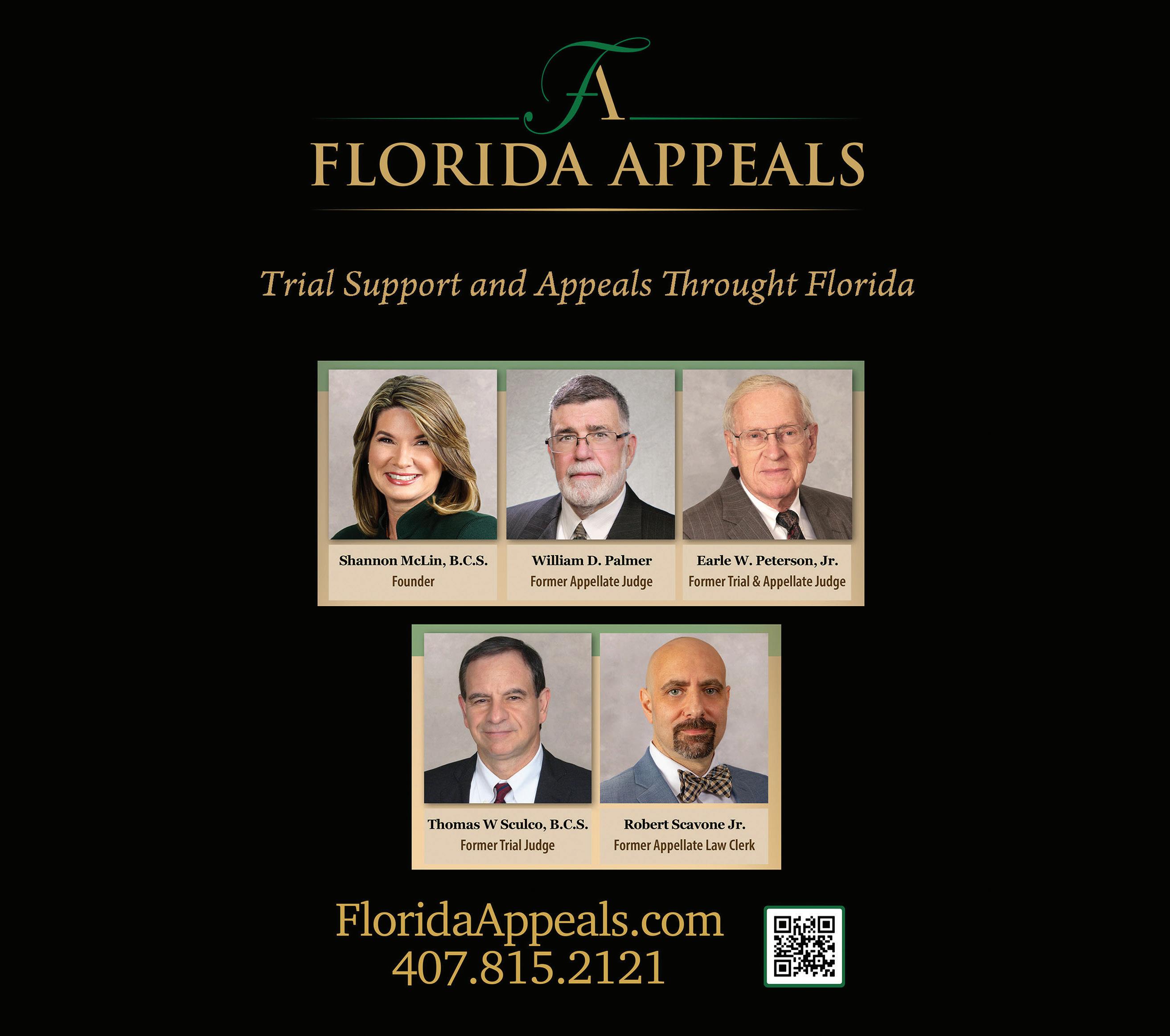
HONORING OUR AWARDEES
The OCBA 2024 Professionalism Awards Recipients

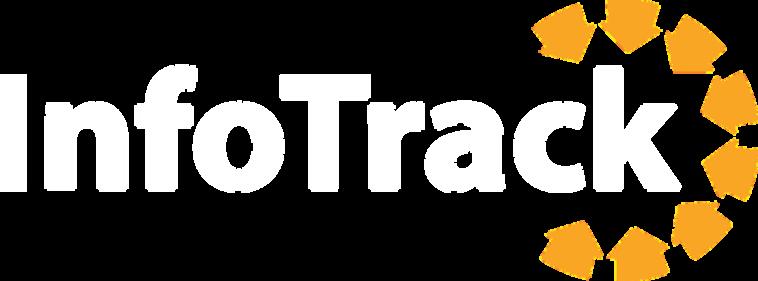






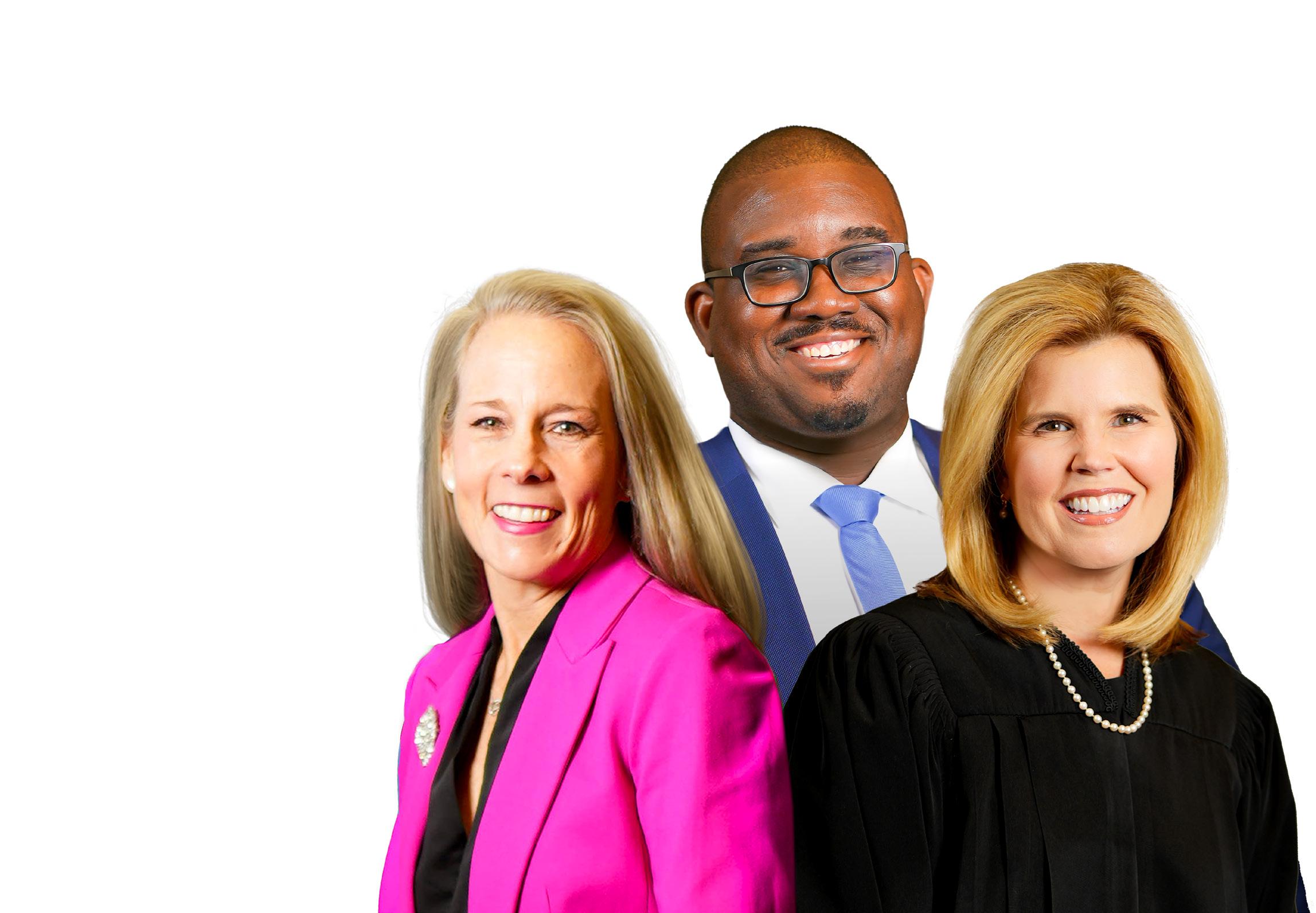
Meet the OCBA 2024 Professionalism Awards Recipients LETTERS FROM LEADERS
Can’t we all just get along!?
Amber Davis, Esq.
08 I CLERK’S CORNER
Extending Saturday Hours for Customers’ Convenience
The Honorable Tiffany Moore Russell, Esq.
10 I CHIEF’S COLUMN
You be the Judge
The Honorable Steve Jewett OCBA
16 I TEACHING TIPS
The Brandon Act Help
Valerie Crawford
18 I PROFESSIONAL DEVELOPMENT
The ABCs of AI for Lawyers
Brikena Isai Tomasic, Esq.
FROM THE COMMITTEES
When “C” Meets “Z” Therese A. Savona, Esq.
Exploring Alternative Business Structures in the Legal Field
Melissa Bryan, Esq. & Sasha Watson Sankey, Esq.
LEGAL AID SOCIETY
The Power of Pro Bono Work
Vanessa Clark, Esq. & Laura Sanchez, Esq.
SIDEBAR: NEWS / EVENTS / UPDATES
Alena V. Baker, Esq.
Sean Mendez-Caitlin, Esq.
Magazine: 10th of month prior to publication
eEdition: 20th of month prior to distribution
Copy: Six weeks prior to publication
If the deadline falls on a weekend or holiday, the deadline is the next business day. Publication of advertising herein does not imply any endorsement of any product, service, or opinion advertised. The opinions and conclusions, including legal opinions and conclusions contained herein, are those of the authors and do not reflect official endorsement by the Orange County Bar Association or its officers and directors, unless specifically stated as such. ©2023 Orange County Bar Association. All rights reserved. ISSN 1947-3968

880 N. Orange Ave., Orlando, FL 32801
Phone (407) 422-4551 Fax (321) 430-1558
orangecountybar.org
Legal Aid Society (407) 841-8310
Citizen Dispute (407) 423-5732
Family Law Mediation (407) 423-5732
Lawyer Referral Service (407) 422-4537
Foreclosure Mediation (407) 515-4330
Young Lawyers Section (407) 422-4551
Editor John M. Hunt
Associate Editor
Ryan Tindall
Columnists
Alena V. Baker
Sean Mendez-Caitlin
Officers
Amber Davis, President
Arti Hirani, President-Elect
Keshara Cowans, Treasurer
Lisa Guerrero, Secretary
Lauren Reynolds, YLS President
Executive Council
Stephanie Alcalde
Michael Barber
Lori Caldwell Carr
Kate Hollis
Kristopher Kest
Jessica McGinnis
Bruce Mount
Karen Persis, Ex Officio
Alisia Profit
C. Andrew Roy
Brandon Sapp
Jennifer Thomas
Jessica Travis
Executive Director Rob Garay
Advertising & Sponsorship Manager
Ursla Gallagher
Marketing and Communications Manager Reatha Cruz-Johnson
Design Em Agency, emagency.com


Thursday, April 18 at the Citrus Club
255 S Orange Ave STE 1800, Orlando, FL 32801
Experience the excitement of Law Week at our highly anticipated Law Week Luncheon, where we showcase a range of engaging activities that highlight the legal profession’s impact on our community. From the prestigious Liberty Awards to the thrilling High School Mock Trial Competition, captivating Big Bad Wolf Trial Presentations, and inspiring Poster & Speech Contest, Law Week offers a multitude of opportunities for legal enthusiasts of all ages.
RSVP by Monday, April 15, 2024
Ashley Velez ashleyv@ocbanet.org | orangecountybar.org/page/store RSVPs and cancellations will not be accepted after April 15, 2024.
TITLE SPONSOR
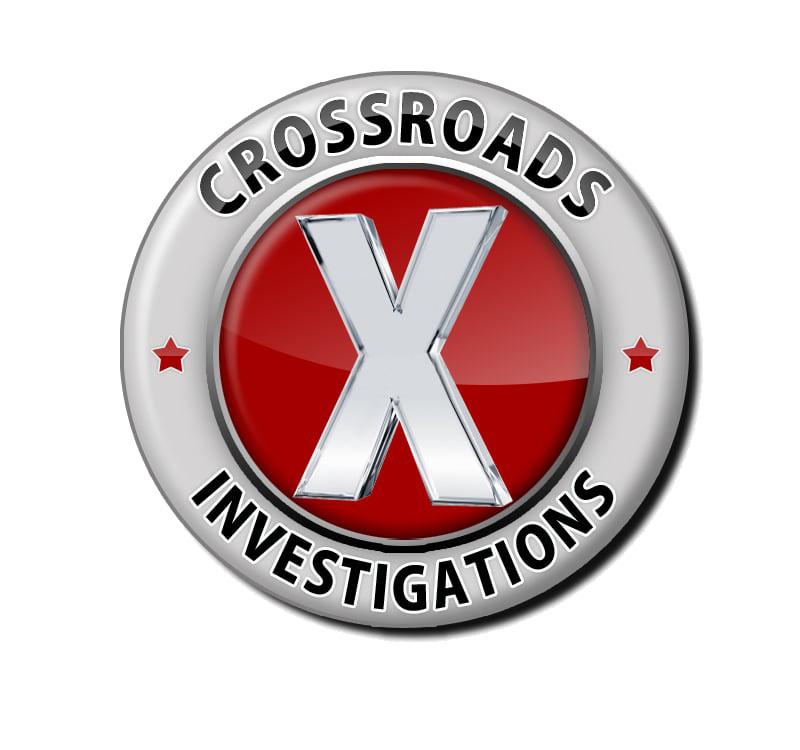
MORE EVENTS
orangecountybar.org/calendar
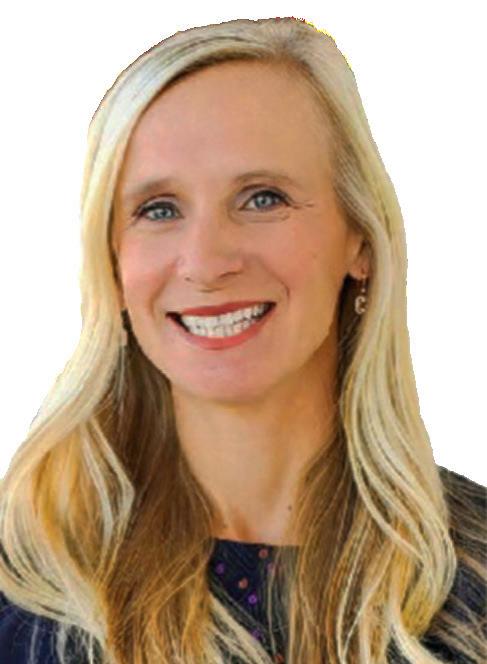
When I stood at the podium last May, I discussed three primary goals for my term as OCBA President, namely, work life balance, health and wellness, and professionalism. This month we celebrate our professionalism award recipients, so I want to first congratulate each of them on a job well done, and second, do my best to relay to each of you why professionalism is important more now than ever before.
I was awarded the Lawrence G. Mathews, Jr., professionalism award back in 2018, about one month before my daughter Cameron was born. I remember being very humbled and excited to win the award but also concerned my water may break on the stage during my speech! One of the things I mentioned in my speech, and later in my article in the Briefs, is that it is okay to disagree, but you don’t need to be disagreeable.
I have been practicing for 18 years, and while each year I tend to encounter at least one attorney on the other side of the case that gets under my skin, makes derogatory comments, raises his or her voice, or outright does something that warrants a grievance being filed, things have gotten progressively worse since the pandemic. In 2020 and into 2021, attorneys seemed nicer, more collaborative, and had that thing called “empathy” I spoke about in a prior article. This is likely because we were all scared, not sure whether we were going to live or die or whether our family was going to be okay, and so for once, we were focused on attempting to work together to resolve cases instead insulting of each other, serving a complaint on Christmas, or purposefully propounding discovery so that the responses are due the day
before Thanksgiving. After doing this for 18 years, I am honestly disgusted by some of the conduct I have seen, and I’m hearing more and more colleagues question whether litigation is even worth doing.
I honestly wish, however, that we could go back to how it was during the pandemic, sans the coronavirus obviously, and just stop trying to pad the bill, making the other side “pay,” and doing everything you can to ruin opposing counsel’s day. It doesn’t need to be like this. I have lost count of the number of cases where I offered a settlement on day 10 of the case that the other side refused to accept, essentially calling me crazy, and then 6 months later and tens of thousands of dollars later, the case is settling for almost that exact offer. Why did we have to spend the last 6 months fighting and spending our client’s money? Why can’t we just be reasonable and stop trying to prove something?
During this month, which focuses on professionalism, we should sit back and reflect on how we handle ourselves during litigation and question whether it is really in our client’s best interest or is it just to prove something or to meet a certain billable hour requirement? I urge all of our members to have a little empathy, and not only put yourself in your client’s shoes, but put yourself in the opposing side’s shoes. Maybe if we do this, and we set our pride aside for a little while, we can come to a creative resolution for our clients in a much more efficient manner and truly serve our client’s best interests.
Instead of sharing a book this month, I have two of my favorite professionalism quotes that I would like to share. The first is from David Maister: “Professionalism is not
a label you give yourself – it’s a description you hope others will apply to you.” This quote underscores the importance of perception and reputation in the legal field. As attorneys, our professionalism is judged by other attorneys, judges, clients, and our peers. It is important that we build a reputation for reliability, competence, and ethics so that others describe you as professional, ethical, and fair.
The second quote is from John Wooden, and he states, “Your reputation is what others think of you; your character is what you truly are.” This quote highlights the difference between reputation and character. We all care dearly about our reputation, and we certainly should, but if we have character, we won’t need to worry about our reputation because our character will shine through. In the words, if you have strong character and a strong reputa-
tion, that professionalism label will follow. Character reflects our fundamental values, principles, and behavior.
As attorneys we need to demonstrate our character, integrity, and professionalism in all interactions whether we are speaking to a judge or a janitor. The tone and demeanor of the conversation should not change. I ask that each of you think twice before you send that email or make that derogatory comment. We are here to do what is in the best interests of our clients and I highly doubt that means you must attack opposing counsel. Zealous advocacy should never include acting
“Your reputation is what others think of you; your character is what you truly are.”


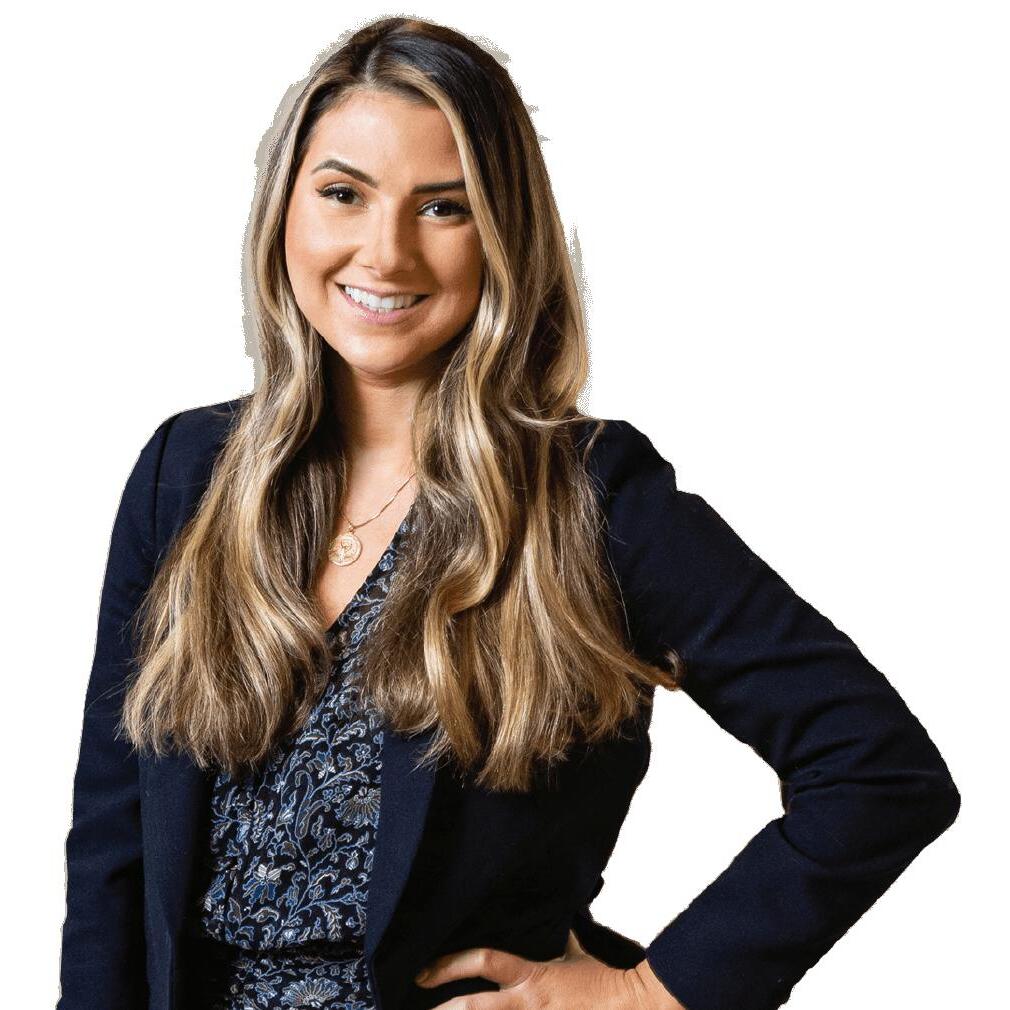
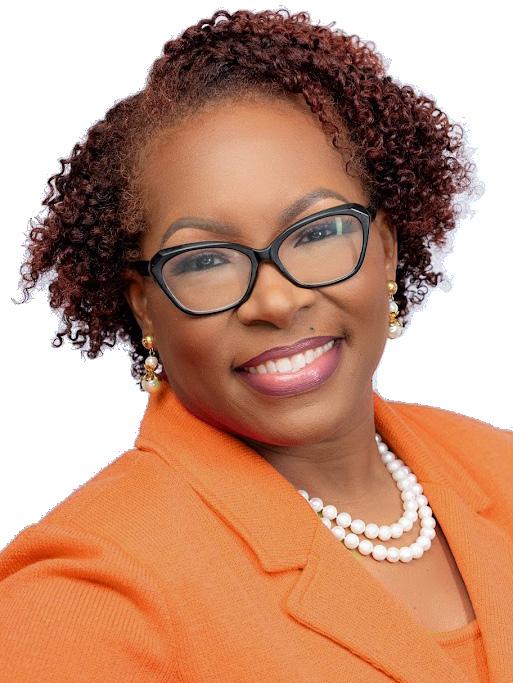
This month I am pleased to share I’ve decided to extend Saturday hours at two branch locations to help customers access the services they need with my office.
We began these extra days in June of 2023 at the Winter Park and Ocoee branches of the Clerk’s Office as a pilot project to determine if the public would find the hours helpful. Due to the positive response, I decided to continue the extra Saturdays throughout 2024.
These weekend days in Winter Park and Ocoee allow customers to access services such as marriage licenses and ceremonies, passports, and payments. These services are the same options offered during the week at these locations. Appointments are also available on these days for passports and marriage services. In fact, even a wedding ceremony can be performed.
The following are the Saturday dates the branch offices are open the rest of this year from 8�00 a.m. – 12�00 p.m.:
March 9 | April 13 | May 18 | June 8 | July 13 | August 10 | September 14 | October 12 | November 9 | December 14
Our Saturday hours were popular with customers who took advantage of the extra days. We all know how busy work, school, and activities can be for families, so this is another option to make doing business with us easier.
I hope that you will be able to take advantage of some of these convenient Saturday hours and pass along this information where you can.
As always, I continue to look forward to future opportunities where my office can make it easier for customers to access our services and do business with us.
Until next time,

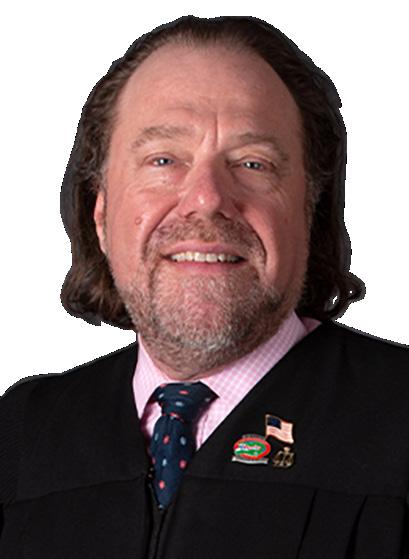
ing, policy making, and accountability in oversight and program administration. In 2023, the OCBA, as part of law week, stepped up to assist in the local logistical operation of the championship competition annually held in the Orange County Courthouse.
TO VOLUNTEER, CONTACTJILL DAVIS Jill.Davis@orlandohealth.com BRANDON SAPP brandonmsapp@gmail.com JUDGE STEVE JEWETT ctjusj2@ocnjcc.org
Do you remember the name Susan Boyle? She was a 47-year-old Scottish woman who appeared on “Britain’s Got Talent” TV show in 2008, the precursor to “America’s Got Talent.” When she walked onto the stage, she was greeted with giggles from the audience and eye rolls from the notoriously acerbic Simon Cowell. With her frizzy, gray-tinged hair curling wildly and an ill-fitting dress, Boyle looked the antithesis of the American Idols Cowell normally anointed. However, that all changed when she began to sing. Launching into “I Dreamed a Dream” from the musical “Les Misérables,” her soaring voice drew startled looks and then delighted smiles from Cowell and the other judges. The audience leapt to its feet to applaud. The moment went viral on YouTube and Boyle became a worldwide sensation.
The teams competing in the state competition are chosen by judicial circuit. One team from each judicial circuit advances to the state competition. Each circuit is responsible for organizing and holding their own circuit competition. Until recently, a maximum of 20 teams could advance to the state finals, one per judicial circuit. However, starting in 2024, the advisory council changed the policy to allow a circuit with more than 20 schools participating to send two teams. At this point, only Dade County has surpassed that benchmark with 30 teams in their Circuit. Therefore, they will be sending two teams to Orlando this year.
This program is vitally important, not only for the student participant’s future, but also for the future of the State of Florida.
Why am I dredging up reality TV history? Only to say I have experienced the same startled looks and delighted smiles time and time again on the faces of first-time high school mock trial judges. The judges come into the experience with low expectations. Their looks say, “They are high school kids - how good can they be?” Those judges’ opinions and their facial expressions change very quickly as they realize the students are talented trial attorneys. Suddenly, they’re smiling and shaking their heads in bemusement.
The Florida High School Mock Trial Program was launched in 1991 by Professor Annette Boyd Pitts and former Florida Bar Executive Director, Marshall Cassedy. Today, the program is administered by the Justice Teaching Center at Florida Southern College. I am proud to serve on the three-member statewide advisory committee responsible for rule draft-
In 2024, the Ninth Circuit will have five teams competing in the circuit competition. They are Boone High School, Timber Creek High School, Trinity Prep, Orangewood Christian School, and the Southlake Home School. The competition will be held February 8 at the Orange County Courthouse where Boone will be defending their Ninth Circuit championship.
Each team is made up of six students – three who act as attorneys and three who will portray the required witnesses. The attorneys must each do one direct examination and one cross examination. One of the attorneys gives an opening statement and another the closing argument. Since the direct is of their own student witness, it tends to go smoothly. The cross is where the real fun starts. The attorney crosses the other team’s student/witness, and the interaction can become contentious.
The attorneys are individually scored on each direct and cross. The opening and closing are also scored separately. The witnesses are scored on their performance during both direct and cross. All scores are based on a 0-100 scale. At the end of the round, the scoring judges cast a ballot for the team they feel performed the best. Those “ballots” are added up to determine
the winner. The numerical score is only used as a tiebreaker. In addition, the scoring judges vote for most effective attorney and witness.
Volunteer attorneys and law students annually develop the case materials. For the last several years, the case has been written by attorney and former mock trial coach, Steve Renick and some of his former students/mock trial team members. The authors develop a case that is topical and engaging for the students. The case annually alternates between civil and criminal matters. Last year was a second-degree murder case stemming from an allegation that a spurned boyfriend/girlfriend tampered with the brakes of their ex’s vehicle resulting in a death. This year the case is a civil case challenging a student’s expulsion stemming from an allegation of plagiarism by use of AI in the writing of a term paper.
There are four preliminary rounds. After those rounds, the top two teams move on to the championship round. Those teams go head to head on Saturday afternoon in the ceremonial courtroom on the 23rd floor. The winning team advances to represent Florida in the National High School Mock Trial Championship.
Hundreds of attorneys and judges volunteer to participates in the circuit and state competitions annually. I want to give a big shout out to my Ninth Circuit brethren for volunteering countless hours as presiding judges over the last 15 years.
This program is vitally important, not only for the student participant’s future, but also for the future of the State of Florida. Students learn critical thinking skills, legal reasoning, analysis, persuasive speaking, and professionalism. They also gain insight into the structure and function of the courts and the legal process. And you can play a part in that important education by volunteering to be a scoring judge.
This year’s state competition was held March 7-9. Next year’s competition will also be held in March. Won’t you help the kids and volunteer for a round? I promise you will have a great time. Have your own Susan Boyle moment-volunteer for a round or two or even three!
Daniela C. Alvarado
Richard Anthony Arena
Deborah L.Barra
Stephen E. Chambers
Melissa Dean
Fenya M. DelFyette
Kate D. Dukes
Shameeza S. Embrey
Jonathan E. Freidin
Chelsey Estes
Lisa Figueroa
Philip Freidin
Lena Fucile
Karin Gerardin
Julio E. Gil de Lamadrid
Kim Nguyen Gray
Stephen Harber
Hillary Hazeltine
Rose Hernandez
Marcus Hyatt
Pedro A. Jedlicka
Ryan M. Kocse
Brittany Kurland
Taylor Lee
Brent Alexander Lightfoot
Jesse Harold Larsen
Vanessa Marquez
Jacob Scott Mayer
Xanquila Mckinnon
Stephen Mistoler
Amy V. Mitchell
Kevin A. Moore
Christopher M. O’Connor
Leslie King O’Neal
Carlos A. Otero
Stefano D. Portigliatti
Maud Poudat
Walter Roberts
Jessica Safford
Lauren Schieffelin
Jacob M. Schuster
Jacob S. Slotin
Hannah Waddell
Herin Warner
Sonya Wesner
Bryan E. Wilson
Remeshe Wynter
Gloria Ubiles
Stephanie V. Graves
Ronald Zmuda
Annelle De Jesus Abikarram
Natalia Diaz
Katherine V. Grasshopper
Luc Robert Louis-Jacques
Sophia G. Marcano
Ameer H. Abdelbary
James Basile
Taisha Decossard
Maria Delgado Cerna
Elizabeth N. Duprey
Philip Fusco
Jeremiah I. Garnett
Jasmine Harmon
Olga Larus
Jonathan D. Loew
Emily Mizner
Jared Moskowitz
Nicholas J. Oropeza
Kristin V. Rahim
Brenden J. Rendo
Ariane Williams
Natalia A. Velez
The Orange County Bar Association strives to increase the civility and professionalism of its members by offering seminars, publishing articles in The Briefs, and reaching out to local law schools, elementary, middle, and high schools, and the community at large with activities that promote the profession and our system of justice. Through our annual Professionalism Awards, we recognize three members of the legal community whose practice, services, professionalism, ethical conduct, demeanor, and high moral standards best embody the qualities we all seek to emulate. The OCBA is proud to announce the following individuals as this year’s awards recipients.
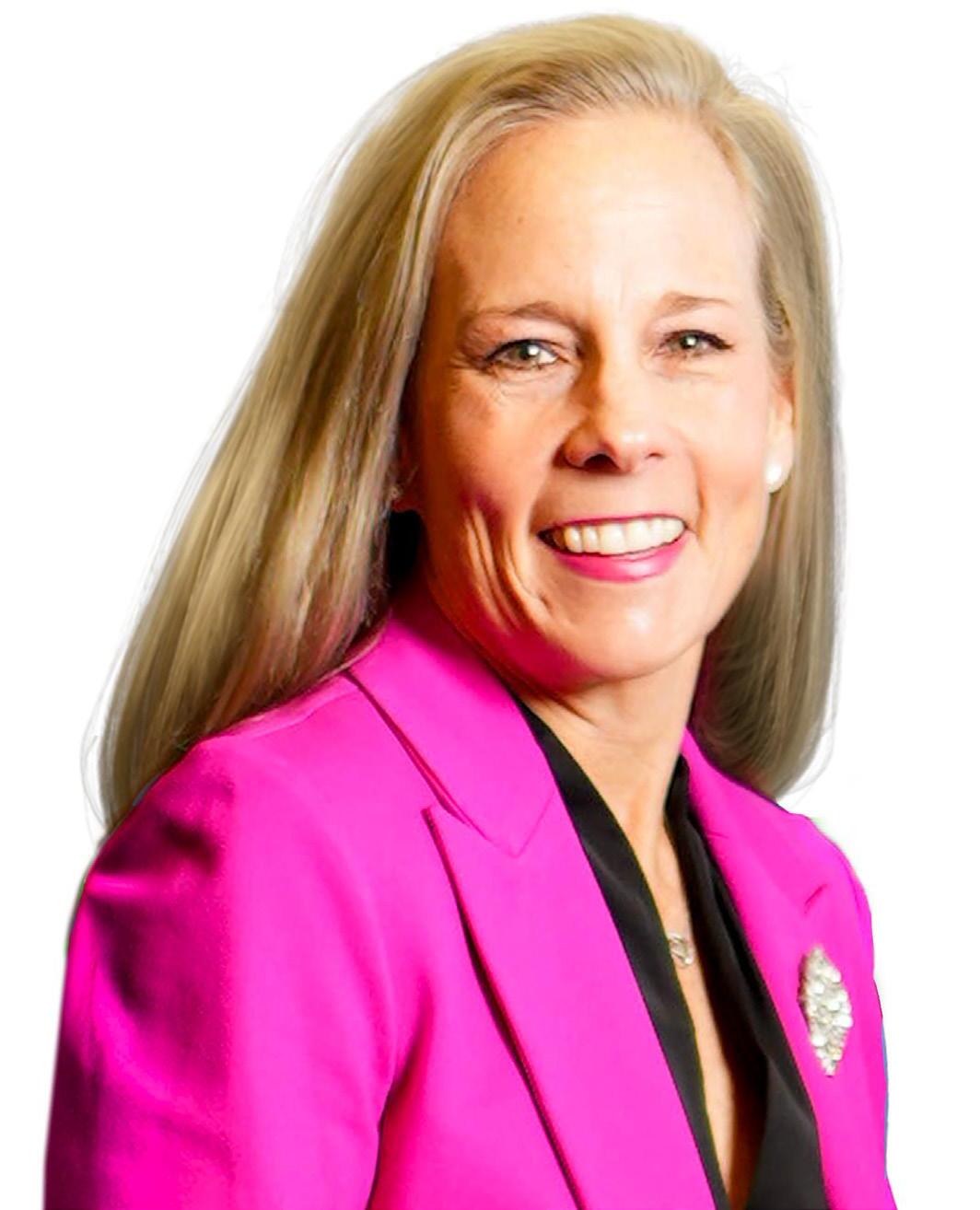
ESQ.
William Trickel, Jr., Professionalism Award
Jamie Moses, a graduate of Notre Dame Law School, has been a stalwart presence in the legal community since 1994. Her extensive service on numerous committees and boards reflects her unwavering commitment to community engagement and
professional excellence. Recognized for her dedication, Ms. Moses has received prestigious awards such as the Ninth Circuit Pro Bono Award, The Florida Bar’s Excellence in the Promotion of Board Certification, and The Florida Bar YLD Most
Recipient. As a Partner at Holland & Knight, she excels in litigation and appellate work, while also serving on the firm’s Health and Wellness committee, underscoring her ongoing commitment to organizational well-being.
Known for her exemplary professionalism, Jamie Moses is admired for her courteous demeanor and willingness to mentor fellow attorneys. Her prompt responsiveness to calls and emails, coupled with her willingness to offer guidance, sets her apart in the legal community. With a track record of leadership and dedication, she consistently exceeds expectations in her roles, fostering a collaborative and productive environment. Her involvement with the Special Olympics triathlon team showcas-
es her commitment to excellence beyond the legal realm, embodying professionalism in all aspects of her life.
Jamie Moses’s remarkable career is a testament to her humility, leadership, and unwavering commitment to excellence. Her extensive involvement in legal organizations, coupled with her numerous accolades, underscores her dedication to advancing the legal profession. Her professionalism extends beyond the courtroom, evident in her dedication to community service and her role as a mentor and leader. With a spirit of positivity and a commitment to excellence, Jamie Moses exemplifies the highest standards of professionalism and is a deserving candidate for the William Trickel, Jr., Professionalism Award..
Jamie Moses’s extensive service on numerous committees and boards reflects her unwavering commitment to community engagement and professional excellence.
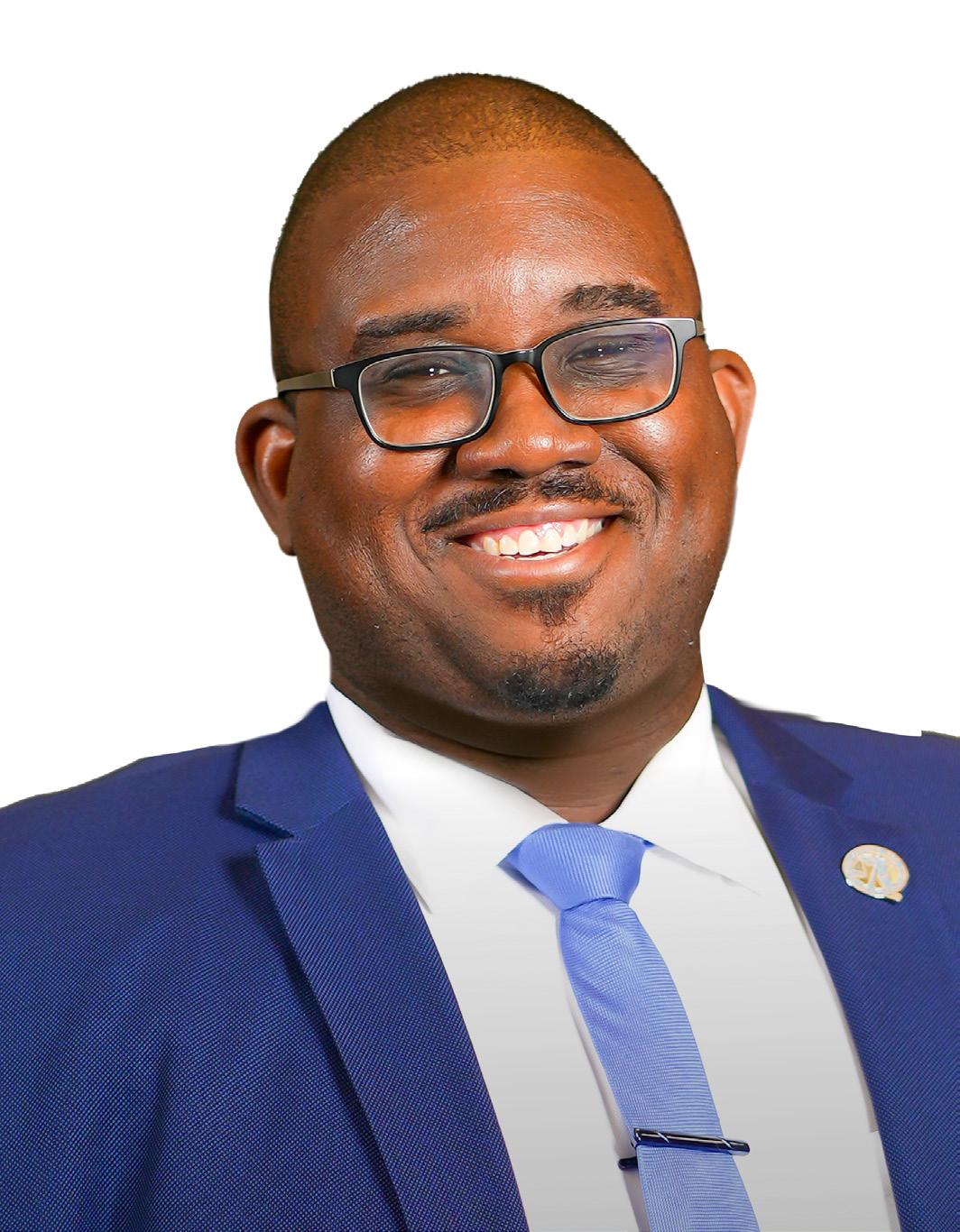
Brandon Sapp’s track record of leadership, ethical practice, and commitment to service makes him a standout nominee for recognition. Serving as the President of the Young Lawyers Section of the Orange County Bar Association and the Paul C. Perkins Bar Association,, Brandon has demonstrated his ability to inspire and guide his peers while earning their high regard. His accolades, including Super Lawyers Rising Star and Best Lawyers Ones to Watch, underscore his excellence in the legal profes-
sion. Brandon’s extensive service to the community and profession, coupled with his unwavering display of ethics and high moral standards, align perfectly with the award’s emphasis on honoring exemplary professionalism.
Having served alongside Brandon on the OCBA Young Lawyers Section board, I’ve witnessed firsthand his exceptional leadership and dedication to our legal community. His passion for giving back is evident in his commitment to service and mentorship, where he fosters connec-
tions and makes individuals feel valued within the organization. Brandon’s ability to create a sense of community and champion others underscores his role as a model of professionalism and service, encouraging others to strive for excellence in their professional endeavors.
Brandon Sapp’s impact extends beyond his age group, touching the lives of countless legal professionals through his ex-
emplary leadership and service. His considerate nature, willingness to help, and dedication to improving the legal community exemplify the qualities of a true professional. Brandon’s commitment to mentorship and his unwavering support for others in achieving their professional goals further solidify his status as a model of professionalism and service in the legal profession.
Brandon’s extensive service to the community and profession, coupled with his unwavering display of ethics and high moral standards, align perfectly with the award’s emphasis on honoring exemplary professionalism.
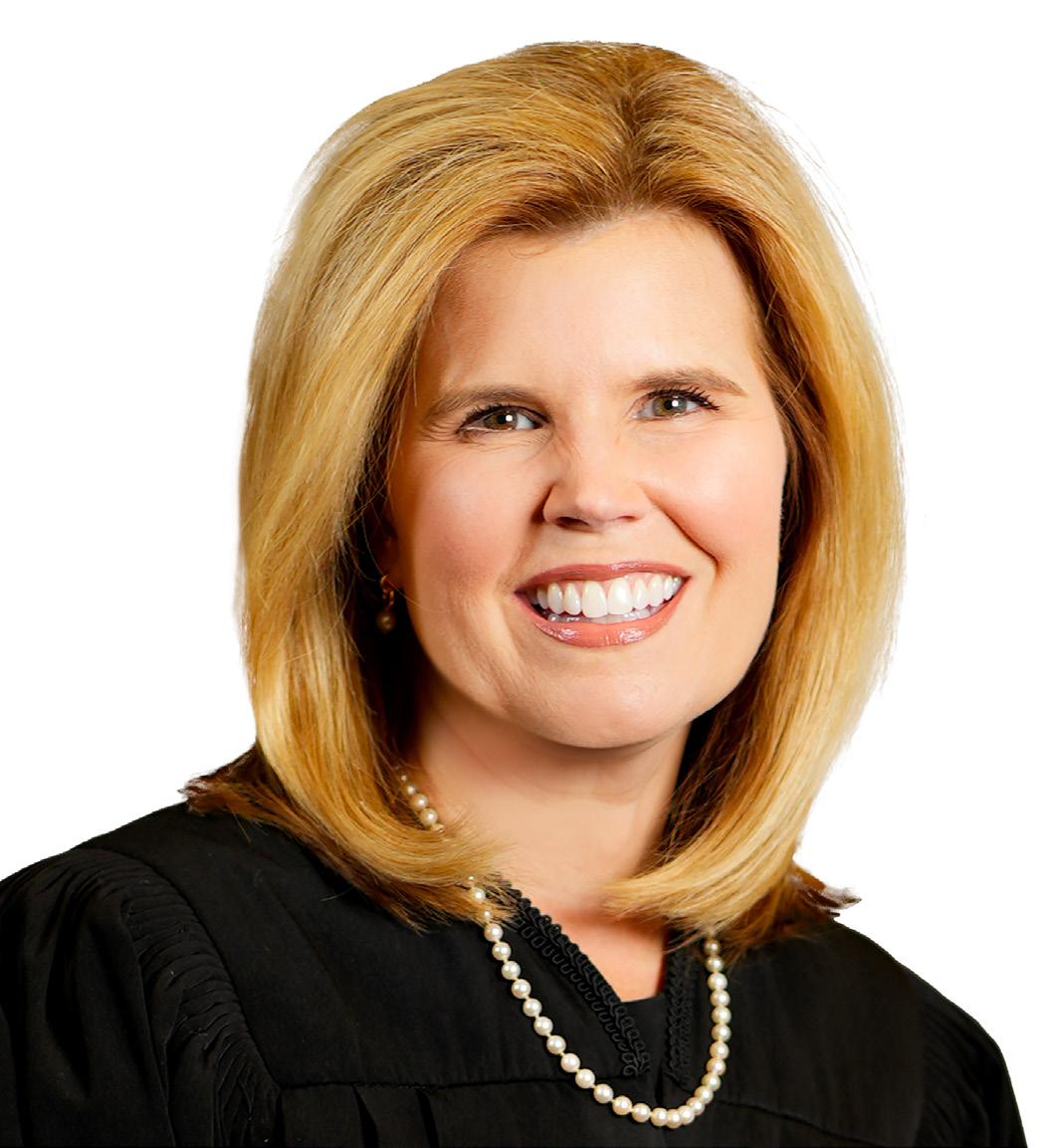
Judge Heather Pinder Rodriguez is a shining example of legal excellence and unwavering dedication. With a background in construction law, she has tirelessly advocated for pro bono service, setting
new standards for excellence as Holland & Knight’s Pro Bono Coordinator and earning accolades such as the Florida Bar Young Lawyers’ Section Pro Bono Award. Her commitment extends beyond the court-
Thursday, April 11, 3-5 p.m. | Jury Assembly Room, Orange County Courthouse
Keynote Speaker: Scott Westheimer, Esq. The Florida Bar President Attendance during the remarks provides CLE credit. RSVP by Monday, April 8. bit.ly/ProAwards24
room, as she mentors the next generation of legal professionals through her involvement with the [insert rival college’s name here] of Law Alumni Board of Directors and her leadership in promoting gender equality within the legal community.
In the family law division, Judge Rodriguez’s impact is profound, despite her background in a different area of law. As President of the Central Florida Family Law Inns of Court, she has championed professionalism and ethical conduct, earning the re-
spect of her peers and colleagues. Her innovative pilot programs in Osceola County have sought to improve the judicial process, leading to her appointment as Associate Administrative Circuit Judge for Domestic Relations in 2020.
Beyond her legal achievements, Judge Rodriguez’s philanthropic spirit knows no bounds. Whether serving her church community or embarking on mission trips to Kenya, she remains steadfast in her commitment to uplifting others and making a positive impact on society. In every facet of
Whether serving her church community or embarking on mission trips to Kenya, she remains steadfast in her commitment to uplifting others and making a positive impact on society.
her life and career, Judge Heather Pinder Rodriguez exemplifies the principles of professionalism, integ-
rity, and service, making her a deserving recipient of the James Glazebrook Professionalism Award.
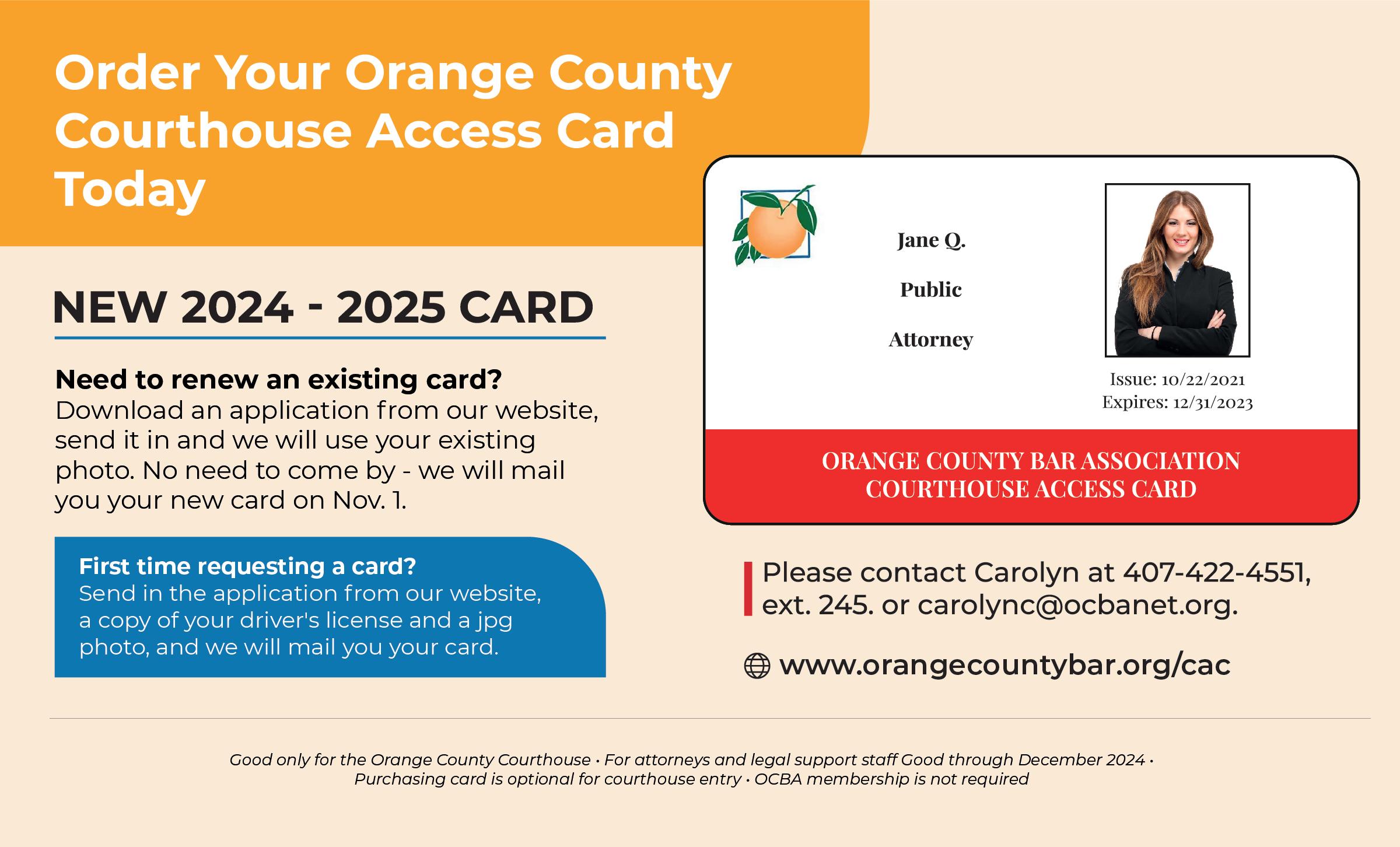
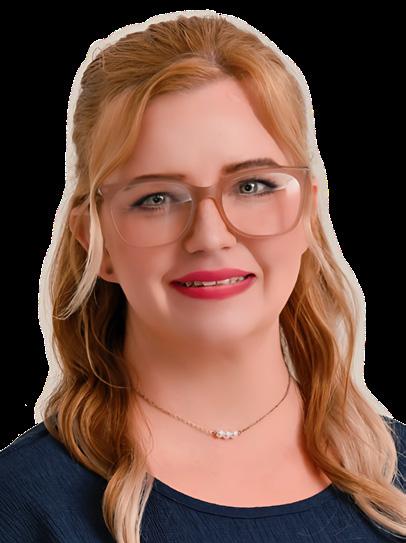
Living a life in the military can be very different from others. Living this lifestyle can be exciting and fulfilling but brings complex and challenging moments. Service members relocate frequently, and deployments can result in long periods away from family and loved ones, including communications cut-offs. Stressful experiences from combat leave long-lasting negative effects. There are also those who encounter sexual assault, hazing, and toxic leadership in the chain of command. Going through these experiences often leads to aggressive, dismissive, or condescending attitudes, and can even lead to suicide.
vice members from seeking treatment. Because of this, suicide in the military has been increasing among our service members. Research by the Psychological Health Center of Excellence found that up to 70% of service members with mental health symptoms do not seek treatment, and 35% have reported that they worry seeking help would negatively impact their careers.2
The Brandon Act is designed to protect service members who experience mental health and reduce the stigma around reporting mental health concerns.
The stigma of mental health in the military is linked to a desire to handle problems on one’s own and to avoid negative judgment, hazing, and retaliation from leadership or peers. Service members who report mental health concerns are most likely to perceive stigma and anticipate adverse outcomes for seeking help, including career harm1. Leadership had service members convinced they were not allowed to get help, and that if they did, they would be
kicked out with the loss of rank and a dishonorable discharge. Service members were told they were not allowed to go into town to get mental health help either, hence the reason no one got help. Most of the time, if leadership found out someone sought mental health treatment, they would be kicked out. If they were not kicked out, then they would be retaliated against. The threat of being kicked out for seeking mental health treatment deterred ser-
On June 25, 2020, the Brandon Act was introduced to Congress. The Bill was passed by the House on July 21, 2020, passed by the Senate on November 16, 2020, presented to the President on December 11, 2020, vetoed by the President on December 23, 2020, and then passed over veto on December 28, 2020. Finally, The Brandon Act became Public Law on January 1, 2021.3
What is the Brandon Act? The Brandon Act is designed to protect service members who experience mental health and reduce the stigma around reporting mental health concerns. This Bill allows service members to seek mental health treatment and requires a mental health evaluation as soon as a service member self-reports. It also allows service members to seek help
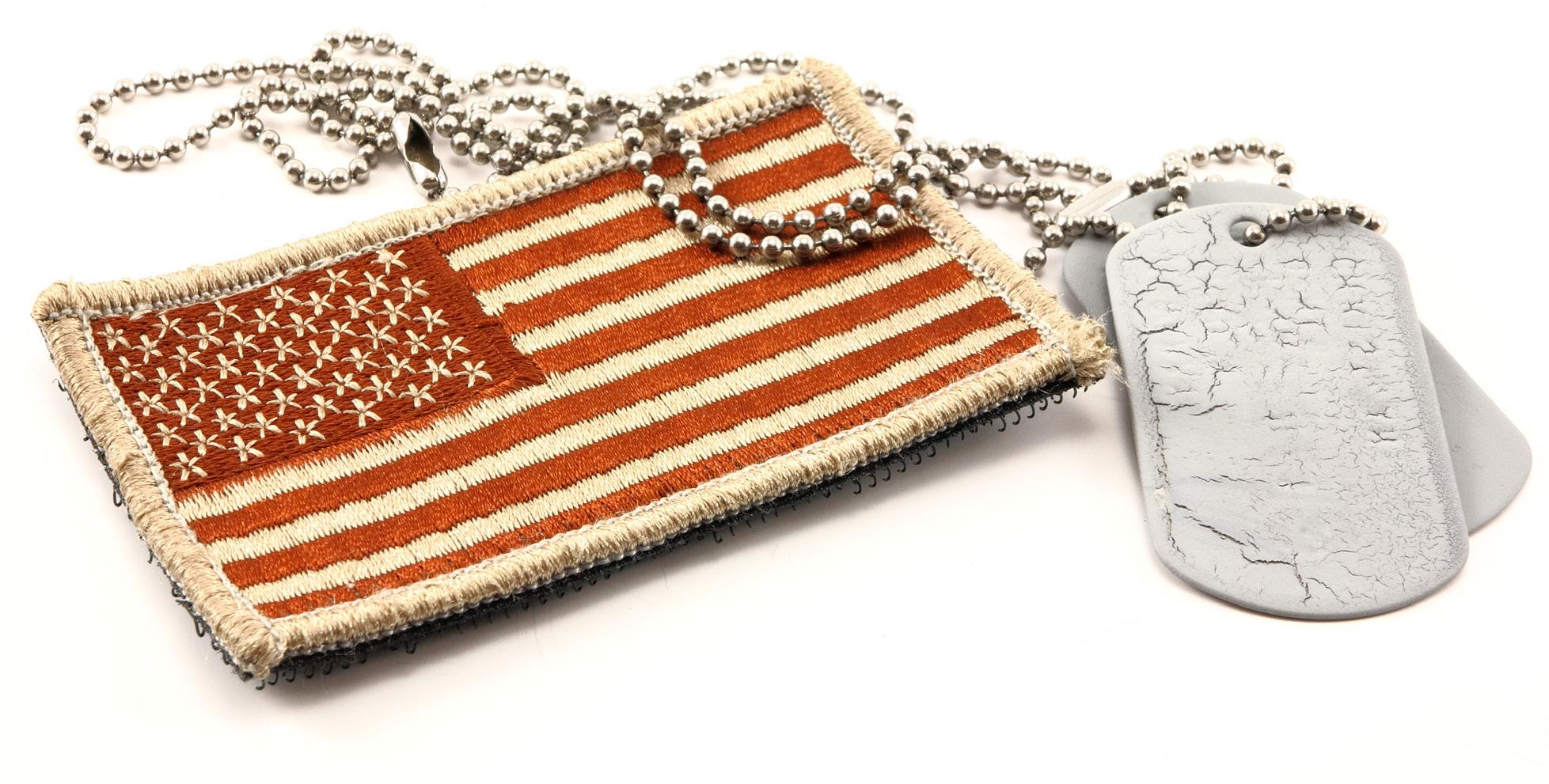
confidentially and, if necessary, outside of the chain of command and kept confidential. This Bill was designed to promote service members to seek mental health treatment without the fear of retaliation. It also enables proper investigations, including criminal investigations, allows service members to leave abusive chains of command, and holds personnel accountable for their actions when appropriate. Its mission is to save the lives of our military service members, military families, and children. The Bill also mandates that the Department of Defense provide annual training on recognizing when members need mental health evaluation. The Navy was the first to implement the Bill, and now all military branches have implemented the Brandon Act.
Brandon Caserta was a 21-year-old Navy Petty Officer Third Class. He died by suicide on June 25, 2018. He worked all day long on June 25, 2018. On the last flight ops of the day, Brandon grabbed his cranial, ran up to the plane Captain, yelled over the noise of the helicopter, “I am sorry for what you are about to see,” and ran to the rotating rear tail rotor, threw off his cranial, jumped, missed, and then jump again and made contact. He did this in front of the watchful eyes of his command and the flight
line. He was not even involved in the flight ops and was not supposed to be on the deck. No one stopped or ran after him when they saw him. After this happened, everyone on that flight line ran away. No one gave him medical attention. His parents and friends later discovered notes describing hazing and bullying from some members and leaders of his helicopter squadron. After asking for help for his mental health, he was bullied and hazed and retaliated against. Not one person in his command helped him. He told many people in his chain of command that he was depressed, and all they told him to do was suck it up and go back to work. Brandon’s parents, Teri and Patrick Caserta fought for justice, getting the Bill passed into law and the legacy of their son.4
I am a Navy mom. My son is stationed in Norfolk, Virginia. I never really understood the life of military families until my only son left home for the Navy. It is full of emotions with many highs and lows. It takes work. You hear about military life, but until it is lived, it cannot fully be understood. As a military mom, it comes with sleepless nights of worry from day-to-day events. There can be many months without any communication while your ser-
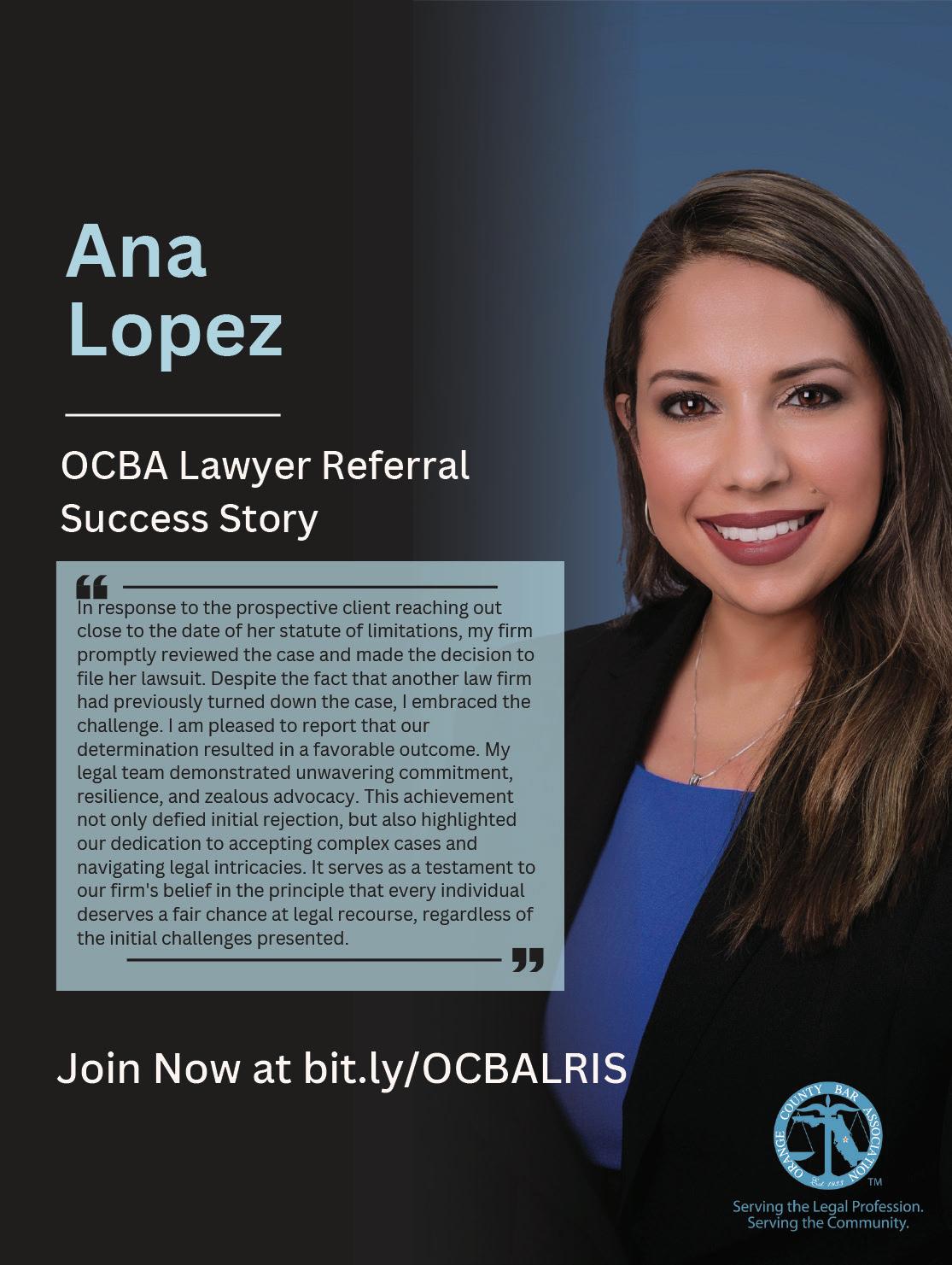
vice member is on deployment. Because of the Brandon Act, I have learned a lot. The conversations with my son are more open and honest. Mental health is discussed often. I am apart of different groups for Navy families, and the Navy community is strong. I have personally spoken to or met multiple families that have
1. Dorothy A. Kaplan, PhD., Reducing Military Mental Health Stigma to Improve Treatment Engagement Guidance for Clinicians, Military Health System, available at https://health.mil/MilitaryHealth-Topics/Centers-of-Excellence/ Psychological-Health-Center-ofExcellence/Clinicians-Corner-Blog/ Reducing-Military-Mental-Health-Stigmato-Improve-Treatment-EngagementGuidance-for Clinicians# (last visited Jan. 31, 2024).
lost their Sailor due to suicide. It is very eye opening. It is not okay to bully, harass, and retaliate against others. It is also okay to get help. If you know someone in the armed forces and they are unaware of the Brandon Act, please share this with them. Bring awareness to our military because they deserve it.
2. Military Health System, Mental Health Utilization and Promotions, available at https://health.mil/Reference-Center/ Publications/2021/08/12/Mental-HealthUtilization-and-Promotions (last visited Jan. 31, 2024).
3. Actions - H.R.7368 - 116th Congress (2019-2020): Brandon Act, H.R.7368, 116th Cong. (2020), https://www. congress.gov/bill/116th-congress/housebill/7368/actions.
4. Teri Caserta, TheBrandonAct.Com, https://thebrandonact.org/.
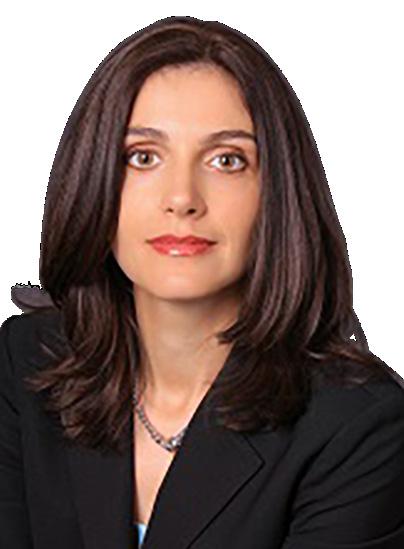
Generative artificial intelligence (AI) made a sensational entrance into the everyday life of the masses in 2023. A rudimentary version of the technology had been around for years, confined only to certain industries and limited purposes. In 2023, with new AI applications entering the mainstream, AI was suddenly introduced as astonishingly sophisticated and impossibly easy to use by everyone. Just open an account with one of the new AI platforms and issue a prompt. Within a short period of time: “Voila!” You can receive an AI-generated anything from computer code to policy papers.
The seduction of AI technological “magic” was palpable and clear. The potential pitfalls took a while to enter the societal awareness. As images created through AI started to circulate, concerns mounted that images may potentially harbor gender and racial bias.1 Further apprehension came into focus about the possibility that malicious actors may use the technology to create videos showing people doing or saying things they did not do or say.2 To add to the anxieties, in 2023, Geoffrey Hinton, the computer scientist dubbed “the godfather of AI”, started giving interviews expressing his misgivings about the technology.3 Then, the judicial system started to get involved. Cases around the use of AI were filed by plaintiffs from various industries. For example, several com-
puter coders sued alleging breach of software licensing terms.4 In another suit, several visual artists filed a class-action case alleging copyright violations.5 In a high profile case, The New York Times sued alleging copyright violations while writers and others have sued alleging use of content without compensation.6
For a while, lawyers were above the fray, until two cases involving sanctioning of lawyers around use of AI made national news in 2023. First, two New York lawyers received sanctions “after a judge found they filed a brief with six fake, AI-generated case citations and later misled the court.”7 One of the attorneys noted he had been under the impression that using an AI platform was the same as using “any other legal research database”, albeit a more sophis-
ticated one.8 Then, a Colorado attorney was suspended for “using artificial intelligence to generate fake case citations in a legal brief and then lying about it”.9 The attorney had turned to an AI platform to pull case law in support of a motion but did not verify them before submission.10 When challenged about the existence of the cases, he lied blaming the matter on an intern.11 Repentant afterwards, the attorney noted that “it ‘never dawned’ on him that AI technology could be deceptive.”12
Clearly, AI technology has the potential to be the catalyst for a seismic shift in both, the society and our profession. AI is already reverberating through the legal world. The legal profession must adopt quickly. Such effort should be broad and multifaceted and at the foundation of it is education, i.e. schooling ones’ self on the ABCs of the challenge to be conquered. What are the ABCs of AI for lawyers?
Amazing Ability: AI technology spawned from a scientific effort to imitate the structure and function of the human brain. The human brain is a sophisticated and elegant machine where “neurons are ar-
ranged in networks big and small. With every action, with every thought, the networks change. This process goes on all the time, and its scale is beyond imagining.”13 Computer scientists like Geoffrey Hinton worked for years on creating and training artificial neural networks. For a long time the results were not encouraging, as the networks “were only moderately successful at the tasks they undertook…”14 Even Hinton, “thought of himself as participating in a project that might come to fruition a century in the future, after he died.”15 Recent technological advancement, however, has been so rapid that this timeline was spectacularly shattered.
Suddenly, scientists were able to build massive interconnected artificial neural networks and use them for machine learning.16 Four factors exponentially “increased the ability to utilize machine learning techniques: (i) the availability of massive datasets allowing for increased training; (ii) increased computing power; (iii) improved machine learning algorithms; and (iv) more available code libraries and frameworks, many open source.”17 Machine learning systems used in AI are different from traditional systems used so far—where humans program information—in that “their knowl-
edge is learned from data: a Machine Learning algorithm runs on a training dataset and produces an AI model. To a large extent, Machine Learning systems program themselves.”18
With machine learning at its foundation, current AI—instead of just following “specific rules” or doing a “particular job” as computer technology has done so far—creates completely new content.19 For example, one can prompt AI, “say, ‘Once upon a time, in a galaxy far away...’. The AI takes that line and generates a whole space adventure story, complete with characters, plot twists, and a thrilling conclusion.”20 Similarly, AI products can perform legal profession tasks at a previously unimaginable depth and detail. Such tasks range from document drafting, document analysis, and template creation to research, citation, and analytics. Moreover, AI technology can perform this normally lengthy and laborious work at lightning speed.
Be Aware: Below are some of the risks identified so far around use of AI by attorneys. The list is by no means all inclusive. It falls upon us, as a profession, to continuously educate ourselves on the pitfalls. Moreover, as the technology is fast-moving, keeping up with the changes is all the more crucial.
• Inaccurate results. At times, AI applications “have been found to provide users with fabricated data that appears authentic.”21 The sources of AI inaccuracies, called “hallucinations,” are “the nature of their training data, the tools’ design focus on pattern-based content generation, and the inherent limitations of AI technology.”22 Hallucinations present “a problem in a highstakes environment where the margin of error is extremely low,”23 such as in the legal world. Even Chief Justice Roberts felt compelled to warn about “hallucinations.”24
• Disclosure of confidential information. “Some AI tools do not guarantee the confidentiality of user inputs.”25 Information in open AI applications may be stored in the cloud with AI creators reserving the right to review information to improve the technology.26 Also, AI tools may come with specific disclaimers that put the burden on the user to protect confidentiality by not sharing sensitive information.27 Ethical obligations involving client and confidential information, thus, come into a new focus when using AI technology.
• Unauthorized use of intellectual property. “While it may seem like
these new AI tools can conjure new material from the ether, that’s not quite the case. Generative AI platforms are trained on data lakes and question snippets — billions of parameters that are constructed by software processing huge archives of images and text.”28 Many legal issues about intellectual property rights in this environment are currently in question.29
• Susceptibility to malware and viruses. While AI can be used for good, bad actors are already watching on how to manipulate it. “Hackers and malicious actors can harness the power of AI to develop more advanced cyberattacks, bypass security measures, and exploit vulnerabilities in systems.”30
Caution Ahead: Currently, there is no comprehensive regulatory platform for AI technology. The European Union has made some strides toward regulation adopting an AI Act.31 In the United States, no laws specifically addressing AI have been passed by Congress but there have been a number of efforts at the administrative level to issue some guidance.32 The burden has mostly fallen to the legal system. A number of orders have been issued by courts at different levels but there is no unified approach
as “[s]ome seek to educate, while others prohibit the use of AI altogether. Most require disclosure of the use of AI or verification of the information…”33
The state bars are making efforts to codify rules for lawyer guidance with the California and Florida bars at the forefront of that effort.34 In 2023, the President of the Florida Bar created a Special Committee on AI Tools and Resources. As of January 2024, the Florida Bar was pursuing changes to professional ethics rules involving competence, confidentiality of information, responsibilities of supervisory lawyers, and responsibilities regarding non-lawyer assistance in order to account for AI. In addition, the Florida Bar Board of Governor’s Review Committee on Professional Ethics has issued Proposed Advisory Opinion 24-01 Regarding Lawyers’ Use of Generative Artificial Intelligence. Needless to say, it is essential for Florida lawyers to keep informed of these developments.
Throughout history, when humans’ limits are tested, they rise to the occasion through preparation, planning and perseverance. Armed with the ABCs of AI, it is up to us, as lawyers, to prepare, plan and persevere in the new AI age. In the end, those might be the traits that separate us, as humans, from future AI machines.
1. See Rachel Metz, AI made these stunning images. Here’s is why experts are worried, CNN Bus., www.cnn.com/2022/06/30/tech/ openai-google-realistic-images-bias/ index.html
(last visited Jan. 3, 2024).
2. Id.
3. See Joshua Rothman, Metamorphosis (The godfather of A.I. thinks it’s actually intelligent— and that scares him.), The New Yorker, Nov. 20, 2023
4. Dylan Walsh, The legal issues presented by generative AI, MIT Sloan Sch. of Mgmt. Ideas Made to Matter, https://mitsloan.mit.edu/ ideas-made-to-matter/legal-issuespresented-generative-ai (last visited Jan. 3, 2024).
5. Id.
6. See Jonathan Stempel, NY Times sues OpenAI, Microsoft for infringing copyrighted works, Reuters, www.reuters.com/legal/ transactional/ny-times-sues-openaimicrosoft-infringing-copyrightedwork-2023-12-27/ (last visited Jan. 3, 2024).
7. Sara Merken, Wary courts confront AI pitfalls as 2024 promises more disruption, Reuters, www.reuters. com/legal/transactional/warycourts-confront-ai-pitfalls-2024promises-2023-12-27/ (last visited Jan. 3, 2024).
8. See Tony Petruzzi and Helena Guye, “The perils of dabbling”: AI and the practice of law, Reuters, www. reuters.com/legal/legalindustry/ perils-dabbling-ai-practicelaw-2023-09-11/ (last visited Jan. 3, 2024).
9. Michael Karlik, Disciplinary judge approves lawyer’s suspension for using ChatGPT to generate fake cases, Colorado Politics, www. coloradopolitics.com/courts/ disciplinary-judge-approves-lawyersuspension-for-using-chatgpt-forfake-cases/article_d14762ce-909911ee-a531-bf7b339f713d.html (last visited Jan. 3, 2024).
10. Id.
11. Id.
12. Id.
13. Rothman, supra, at 28.
14. Id.
15. Id.
16. 1Info. Law Artificial Narrow Intelligence §1:16 (2023)
17. Id.
18. Id.
19. Bernard Marr, The Difference Between Generative AI And Traditional AI: An Easy Explanation For Anyone, Forbes, www.forbes. com/sites/bernardmarr/2023/07/24/ the-difference-betweengenerative-ai-and-traditionalai-an-easy-explanation-foryone/?sh=6c307e7a508a (last visited Jan. 3, 2024).
20. Id.
21. When AI Gets It Wrong: Addressing AI Hallucinations and Bias, MIT Sloan Teaching & Learning Tech Blog, https://mitsloanedtech. mit.edu/ai/basics/addressing-aihallucinations-and-bias/ (last visited Jan. 3, 2024).
22. Id.
23. Niels Martin Brochner, How To Manage The Hallucination Problem Of Legal AI, Forbes, www.forbes.com/sites/
forbestechcouncil/2023/12/14/ how-to-manage-thehallucination-problem-of-legalai/?sh=640e4d7529c9
(last visited Jan. 3, 2024).
24. Krishi Chowdhary, The Supreme Court Calls for Deliberation as AI Reshapes The Legal Sector, TechReport, https://techreport.com/ news/the-supreme-court-calls-fordeliberation-as-ai-reshapes-thelegal-sector/
(last visited Jan. 3, 2024).
25. Brad Hise and Jenny Dao, Ethical considerations in the use of AI, Reuters, www.reuters.com/legal/ legalindustry/ethical-considerationsuse-ai-2023-10-02/
(last visited Jan. 3, 2024).
26. Id.
27. Id.
28. Gil Appel, Juliana Neelbauer, and David A. Schweidel, Generative AI Has an Intellectual Property Problem, Harvard Bus. Rev., https:// hbr.org/2023/04/generative-ai-hasan-intellectual-property-problem (last visited Jan. 3, 2024).
29. Id.
30. Bernard Marr, The 15 Biggest Risks Of Artificial Intelligence, Forbes, www.forbes.com/ sites/bernardmarr/2023/06/02/ the-15-biggest-risks-of-artificialintelligence/?sh=6b73cc032706 last visited Jan. 3, 2024).
31. 1Info. Law Regulatory Developments-EU §1:20 (2023)
32. 1Info. Law Regulatory Developments-US §1:19 (2023)
33. See Merken, supra note 7.
34. Id.
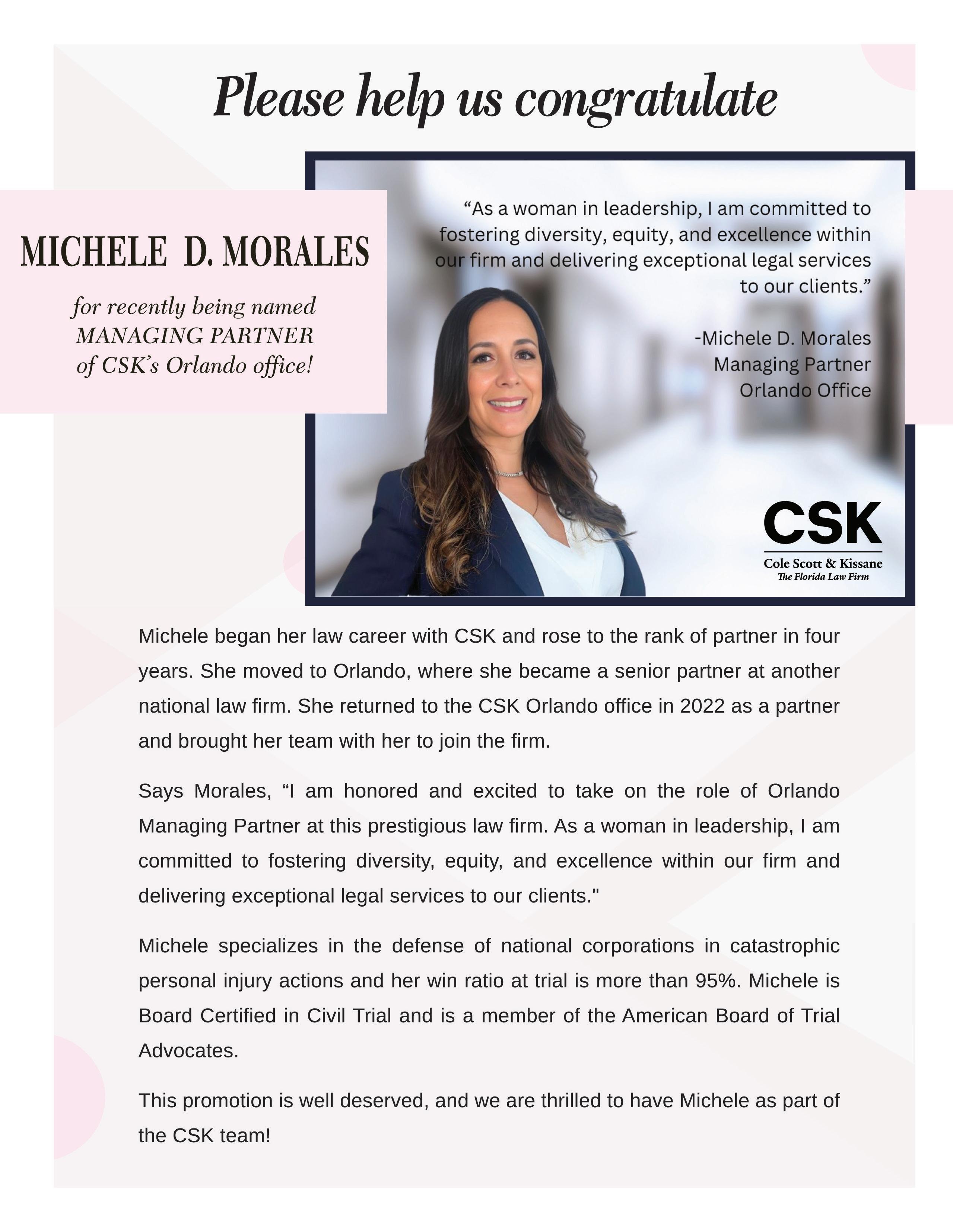
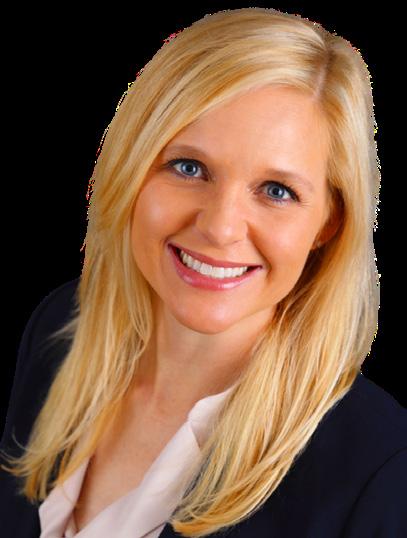
Board Certified in Appellate Practice, and appeals in Florida’s appellate courts and the Eleventh Circuit Court of Appeals, and provides litigation support to trial attorneys. Ms. Savona is the current Chair of the OCBA Professionalism Committee.
1. The Florida Bar Standing Committee on Professionalism.
2. Oxford Reference, Professionalism, www.oxfordreference.com.
3. R. Regulating Fla. Bar Ch. 4, Preamble (“A lawyer’s responsibilities as a representative of clients, an officer of the legal system, and a public citizen are usually harmonious.”).
4. Id.
5. Id.
6. Id.
7. Id.
8. Id.
9. R. Regulating Fla. Bar 4-1.3 (“A lawyer shall act with reasonable diligence and promptness in representing a client.”).
10. R. Regulating Fla. Bar 4-1.3, Comment.
11. Merriam-Webster, Zealous, www. merriam-webster.com/dictionary/ zealous (last visited Jan. 31, 2024).
12. Fla. Bar v. Buckle, 771 So. 2d 1131, 1133 (Fla. 2000).
13. Id. (at 1132)
14. Id.
15. Id.
16. Id.
17. Id. (at 1132)
18. Buckle, 771 So. 2d at 1133.
19. Id.
20. Id.
21. Id.
22. Id. (at 1134)
23. Fla. Bar v. Schwartz, 334 So. 3d 298 (Fla. 2022).
24. Id. 24 (at 300)
25. Id. (at 304; internal citation removed)
26. Jim Ash, Effort to Eliminate “Z” Words from Bar Rules Takes Another Step, Fla. Bar News, Aug. 3, 2023, available at www. floridabar.org/the-florida-barnews/effort-to-eliminate-z-words-frombar-rules-takes-another-step/.
27. See supra note 26.
28. William J. Schifino, Jr., Our Higher Calling, Fla. B.J., Sept./Oct. 2016, at 4.
29. Id.
Can Character, Competence, Commitment, and Civility Be Friends with Zealous Representation?
Professionalism is not an achievement to be marked off a list, but an aspiration that requires continual encouragement, focus, and effort. It is “the pursuit and practice of the highest ideals and tenets of the legal profession” that “embraces far more than simply complying with the minimal standards of professional conduct. The essential ingredients of professionalism are character, competence, commitment, and civility.”1
The definition of professionalism dispels any notion of doubt of its significance: “The combination of qualities and conduct regarded as essential to professional practice. These include knowledge, skills, relevant competence, behavioral qualities, and values of honesty, integrity, ethical probity, and capability of working well with patients or clients, colleagues, and representatives of the public.”2 This is a tall order as it draws on the fundamental fabric of an individual and calls on a lawyer to be ever mindful of the required prismatic characteristics of the profession. Indeed, the different facets of being “professional” –how one treats those outside of the legal community, and then within the legal community, how one
acts towards colleagues, staff, employees, co-counsels, opposing counsels, clients, and of course, the judiciary – do not draw on distinctions between one’s personal life and one’s professional life.3 The embodiment of these qualities and requirements stretches further than taking the Oath of Attorney and being sworn in as a member of the Florida Bar. Being “professional” may stem from lessons and experiences unrelated to the legal profession that shape our viewpoints, even if we do not realize it at the time.
An attorney’s professional responsibilities are set forth in Chapter 4 of the Rules Regulating the Florida Bar. In the Preamble to Chapter 4, different forward-facing elements of being a lawyer are addressed.4 The public as-
pect is first: “A lawyer, as a member of the legal profession, is a representative of clients, an officer of the legal system, and a public citizen having special responsibility for the quality of justice.”5 Regarding a lawyer’s responsibilities towards clients, it enumerates four different elements of advisor, advocate, negotiator, and evaluator.6 Specifically, as an advocate, “a lawyer zealously asserts the client’s position under the rules of the adversary system.”7 The Preamble later notes: “Zealous advocacy is not inconsistent with justice.”8 The word “zeal” is also included in a Comment to Rule 4-1�3 addressing a lawyer’s diligence,9 which provides: “A lawyer must also act with commitment and dedication to the interests of the client and with zeal in advocacy upon the client’s behalf.”10
Focusing further, being a “zealous” advocate describes conduct that is “marked by fervent partisanship for a person, a cause, or an ideal; filled with or characterized by zeal.”11 The definition draws no set parameters
on “fervent partisanship,” leading to referrals for disciplinary actions when a lawyer pushes the boundaries of being a “zealous” advocate for a client.
Over 20 years ago, the Florida Supreme Court decided Florida Bar v. Buckle, a case that resulted in a public reprimand for an attorney who penned a letter to a victim of battery and false imprisonment.12 This letter was sent by Buckle during his legal representation of the criminal defendant after Buckle attempted a few calls to the victim.13 After the second call, Buckle sent a letter to the victim attaching “various religious materials…”14 Upon receiving this letter, the victim filed a Bar complaint against Buckle.15 The victim later testified that the letter was “humiliating and disparaged her character and that it caused her to consider abandoning the criminal complaint…”16 The referee found the letter to not only be “objectively humiliating and intimidating to a reasonable person standing” in the victim’s shoes, but also that the letter “had no substantial purpose other than to embarrass, intimidate, or otherwise burden” the victim.17 The referee further found the letter threatened to exploit the victim “and exploit the most personal and important aspects
and relationships in [her] life, to hold these aspects of her life up to public scrutiny, to expose her.”18 The referee recommended a 30-day suspension of Buckle’s license.19
On appeal, Buckle argued to the Florida Supreme Court that his conduct “did not violate any ethical rules and was, in fact, required by his duty to competently and zealously represent his client.”20 The Florida Supreme Court disagreed, stating “[w]e must never permit a cloak of purported zealous advocacy to conceal unethical behavior.”21 The Court provided further insight regarding its consternation with Buckle’s position:
Certainly, the principles underlying the rules include basic fairness, respect for others, human dignity, and upholding the quality of justice. Zealous advocacy cannot be translated to mean win at all costs, and although the line may be difficult to establish, standards of good taste and professionalism must be maintained while we support and defend the role of counsel in proper advocacy. In corresponding with persons involved in legal proceedings, lawyers must be vigilant not to abuse the privilege afforded them as officers of the court. A lawyer’s obligation of zealous representa-
tion should not and cannot be transformed into a vehicle intent upon harassment and intimidation.22
Since Buckle, the Florida Supreme Court revisited attorney conduct under the notion of being a “zealous advocate” for a client in Florida Bar v. Schwartz. 23 There, a lawyer created two police lineups to be used as exhibits in a pretrial deposition where Schwartz altered the defendant’s appearance:
In one exhibit, he replaced the defendant’s face with that of an individual whom witnesses other than the robbery victim had identified as the perpetrator. In the other exhibit, Schwartz changed the defendant’s hairstyle. However, the altered photocopies used at the deposition retained the victim’s identification of the defendant, including both her circle around what had been the defendant’s picture and her signature at the bottom of the lineup, as well as a police officer’s signature.24
In suspending Schwartz from the practice of law for three years, the Court reiterated that “the requirement to provide zealous representation, as contemplated under our ethical rules . . . does not excuse engaging in misconduct, irrespective of one’s intent to benefit the client.”25
More recently, the use of “z” words – zeal, zealous, and zealously – were questioned by the Rules Committee, followed by a proposal to remove these from the Florida Bar’s rule book.26 Whether “z” words remain or are ultimately removed, being an effective advocate should not be confused with making any argument or taking any position on behalf of a client. “Z terms have a long history. But today, we found that there is more often a negative treatment associated with negative behaviors and labels.”27
Whether a “z” word is used in personal or professional life, the two are inextricably intertwined with the other. An attorney cannot separate who they are as a person no more than they can separate from the shadow they leave on a sidewalk. Hold the door for someone. Agree to an extension. Be candid. These are some simple examples to our higher calling28 as lawyers to further the “c” words — character, competence, commitment, and civility — both within our profession and as representatives of our profession to the public. “Professionalism is what makes being a lawyer more than a job. And professionalism is why we will always be needed and relevant in our society.”29
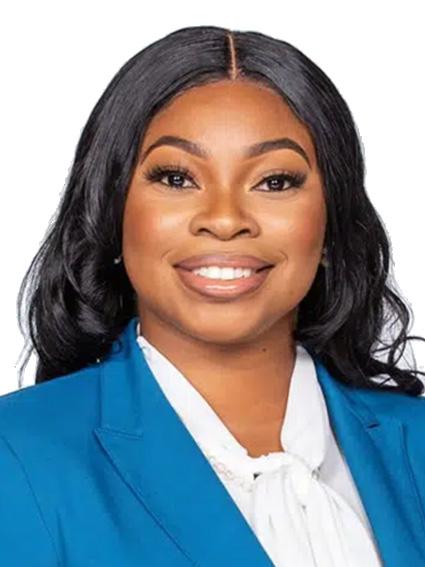
Melissa Bryan, Esq., is an attorney with HAWM, PLLC. Ms. Bryan practices in the area of immigration, focusing on family and employment processes and criminal defense law. She is a committee member of the OCBA Immigration Law and Criminal Law Committee.

Sasha Watson Sankey, Esq., is a Partner at HAWM, PLLC. Mrs. Watson Sankey practices in the area of immigration law, focusing on family, removal defense, business, investment processes, and family law. She is a former chair of the OCBA Immigration Law Committee.
The legal landscape is currently in the throes of a profound transformation, with jurisdictions, including Florida, contemplating the integration of alternative business structures (ABS) into the legal field. ABS facilitates nonlawyer ownership of law firms or the sharing of legal-related fees with nonlawyers. Alternative Business Structures are not new concepts but have gained traction in recent years. The District of Columbia has allowed nonlawyers to be partners in law firms since 1991.1 Arizona and Utah modified their Rule 5�4 to permit alternative business structures in 2021 and 2020 respectively.
from accessing any confidential information related to the ABS. The ABS must otherwise fully comply with the regulatory requirements of the jurisdiction permitting its operation.
In June 2023, the Florida Bar’s Professional Ethics Committee voted unanimously to support Proposed Advisory Opinion 23-1, allowing a Florida attorney to be a passive investor in an ABS in another state that allows non-lawyer ownership of law firms. The Board of Governors has given Advisory Opinion 23-1 the green light for publication and formal adoption in Florida. Conversely in 2021, the Florida Bar’s Board of Governors voted unanimously to reject any amendments to the rules that would permit any form of ABS.
Advisory Opinion 23-1 permits a Florida attorney to engage in passive investment in an ABS situated in another jurisdiction, provided the ABS meets certain criteria. Specifically, the ABS is prohibited from establishing any presence in Florida or offering legal services within the state. The Florida investor-attorney is restricted from assuming a managerial role or providing legal services through the ABS. Active involvement in the day-to-day operations of the ABS is prohibited for the Florida lawyer, who is also barred
As Florida lawyers navigate the intricacies of ABS, it is evident that this most recent action by the Florida Bar represents a significant milestone. The approval of Advisory Opinion 23-1 signals Florida’s appetite, though tepid, for nontraditional business structures within the industry and is likely a pre-
cursor to ABS receiving full authorization, sometime in the future.
• Understanding Alternative Business Structures: An ABS stems from the loosening of restrictions that traditionally limited law firms to ownership by licensed attorneys. The rationale behind ABS is the promotion and acceleration of innovation by fostering collaboration between legal professionals and experts in other fields, increased access to legal services for underserved demographics, and the enhancement of efficiency and competitiveness
of legal service providers. ABS models will result in large scale private investment from major hedge funds and other private equity entities in the legal field. These alternative structures have already taken over in other professional service fields on a large scale. Most notably, in the dental industry, dental service organizations (DSOs) are consuming the field. DSOs allow non-dentist investors to provide integral support to practices. The DSOs typically own the nonclinical assets, such as dental equipment, leases, and intellectual property, and employ the nonclinical employees. The DSO provides critical business management and support such as financial operations, and marketing.
As a result, new dentists, as well as solo and small to mid-sized dental practices have flocked to the DSO model in droves. The dentist is not employed by the DSO,2 and therefore maintains autonomy of their practice, but is a contractor to the facility that provides all the other inputs. These entities can scale rapidly and take advantage of private equity investment to dominate in areas such as marketing and technological advancements. As of 2022, 19% of Florida dentists are affiliated with a DSO while that number is approximately 13% nationwide.3 Some projections for growth show DSO market penetration hitting 39% by 2026.4
ABSs in the legal profession, like DSOs in dentistry, present significant opportunities for solos and small firms to take advantage of economies of scale to increase their competitiveness in a saturated marketplace. Fragmented industries, such as the legal field, are attractive areas for private equity investment due to the potential for exponential scalability and market share growth. In the legal industry, there is no dominant player, with the largest estimated market share of 0�5% being held by Latham & Watkins.5
Regulating the Florida Bar Rule 4-5�4 (c), of the Rules Regulating the Florida Bar, unequivocally states, “[a] lawyer shall not form a partnership with a nonlawyer if any of the partnership’s activities consist of the practice of law.” Consequently, lawyers establishing partnerships with nonlawyers is expressly prohibited once a business transforms into a law firm. The recent allowance for lawyers in Florida to engage in ABS in other states indicates a potential paradigm shift for Rule 4-5�4(c).
Additionally, Rule 4-7�17(b) states that Florida Bar members cannot pay referral fees or provide anything of value to a nonlawyer for referring clients to the lawyer. Furthermore, Florida Bar members are forbidden from directly or indirectly dividing fees with nonlawyers under Rule 4-5�4(a).
With the passage of time, and the dynamic trends in how legal services are promoted and sold, more pressure will be placed on the Florida Bar to reassess its restrictive policy regarding law firm ownership. A more equitable balance between legal ethics and legal business must be explored to enable Florida lawyers to participate in business structures that
benefit both the practitioner and the public. The evolving landscape of ABS in other states necessitates a thorough review of the Rules Regulating the Florida Bar, so as not to disadvantage Florida attorneys. Scrutiny of Rule 4-5�4(c) and Rule 4-7�17(b) is essential to ensure their continued relevance and effectiveness amidst the shifting dynamics of the legal industry. The Florida Bar will need to continuously harmonize the longstanding tradition of high legal ethics with the evolving demands and opportunities presented by alternative business structures.
Benefits of ABS for Lawyers in Florida ABSs have the potential to revolutionize the legal landscape in Florida, providing viable solutions to persistent challenges faced by both clients and attorneys. These challenges encompass issues related to access to justice, access to capital, the integration of innovation and technology, as well as the diversification of legal services.
• Increased Access to Justice: The leading argument for ABS structures is increased access to justice. By reducing overhead costs and leveraging economies of scale, law firms operat-
ing under ABS can provide services at lower costs, making legal representation more accessible to individuals in marginalized communities who may be financially constrained. ABS can contribute to the financial stability of law firms, enabling them to allocate more resources to pro bono and low-income legal services. Additionally, by expanding into areas such as community legal education, preventive legal services, and outreach programs, ABS can proactively address legal issues before they escalate, promoting a more inclusive and responsive legal ecosystem.
• Increased Access to Capital: A key benefit of ABS lies in its capacity to draw external private equity investment, offering law firms crucial capital for technology, marketing, and talent acquisition. This capital infusion improves client services and operational efficiency while fostering increased minority ownership in law firms.
• Innovation and Technology Integration: ABS models can be a catalyst for adopting innovative technologies and modern business practices within law firms at record speeds. The inclusion of non-lawyer stakehold-
ers, often equipped with diverse expertise from other industries, introduces fresh perspectives on enhancing efficiency and client engagement. This collaboration can result in the seamless integration of technology to streamline legal processes, keeping law firms at the forefront of industry advancements.
• Diversification of Services: Non-lawyer ownership facilitated by ABS empowers law firms to diversify their service offerings in response to clients’ evolving needs. This diversification meets the dynamic demands of the legal landscape and fosters interdisciplinary collaboration within the firm. The outcome is the development of new, client-focused legal services that address a broader spectrum of issues and challenges.
• Impact on Professionalism: ABS may have a notable impact on professionalism, prompting concerns about conflicts of interest, the preservation of core ethical values, and the necessity to protect against unwarranted commercial pressures.
• Conflict of Interest Concerns: Allowing non-lawyers to have ownership stakes in law firms may create con-
flicts of interest between the profit motive of non-lawyer stakeholders and the ethical obligations of lawyers to prioritize client interests. Robust regulations and ethical guidelines can be implemented to ensure that lawyers maintain their professional independence and prioritize client welfare over financial interests.
• Maintaining Core Ethical Values: The legal profession has a longstanding commitment to upholding ethical values, including client confidentiality, loyalty, and the pursuit of justice. Critics argue that ABS may erode the traditional values of the legal profession, leading to a focus on profit-making rather than upholding the highest standards of professionalism and ethics. The ownership structure of a law firm is unlikely to compromise the ethical standards of licensed regulated lawyers who undoubtedly will be subjected to more rigorous regulations and codes of conduct to safeguard the core values of the legal profession under ABS. High ethical standards is a central tenet of the profession and is not likely to disappear in the face of ABS.
• Guarding Against Commercial Pressures: The influence of non-lawyer owners in ABS structures may introduce commercial pressures. Detractors argue that ABS may prioritize cost-cutting and profit-maximization over the quality of legal services, potentially leading to a decline in the overall standard of legal representation. Effective regulatory oversight can maintain quality standards by setting benchmarks for legal services, ensuring continuing legal education, and imposing consequences for substandard practices.
• Conclusion: The discourse surrounding ABS within the legal domain necessitates a delicate equilibrium between recognizing potential advantages and addressing valid concerns. Paramount to this equilibrium are effective regulatory measures, diligent oversight, and a stead-
1. American Bar Association, ABA issues guidance on investing in ABS-approved entities when a lawyer is licensed elsewhere, (Sept. 29, 2021), available at https://www. americanbar.org/news/abanews/ aba-news-archives/2021/09/abaissues-guidance-on-investing-in-absapproved-entities-when-a/ (Last visited Jan. 31, 2024).
2. Chapter 466, Florida Statutes.
3. American Dental Association, DSO Affiliation - State Data available at https://www.ada.org/-/media/project/ ada-organization/ada/ada-org/files/ resources/research/hpi/hpidata_ dentist_practice_modalities_2022.
fast adherence to ethical principles. These elements play a pivotal role in mitigating the potential drawbacks associated with ABS, cultivating a legal environment that upholds the highest standards of professionalism and safeguards client interests. While ABS presents promising prospects for increased capital, innovation, and an expanded array of services, it is imperative that the unwavering commitment to the ethical foundations of the legal profession remains steadfast. This commitment holds significant importance for all stakeholders involved. Striking a balance between the business dimensions of legal practice and the preservation of professionalism emerges as a critical factor in successfully navigating the dynamic and evolving landscape of legal practice in Florida.
proudly welcomes Frank M. Bedell
to its distinguished panel.
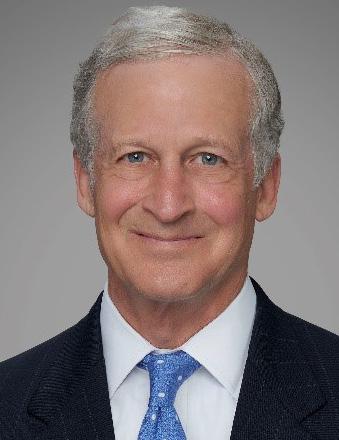 Frank Bedell fbedell@uww-adr.com
Frank Bedell fbedell@uww-adr.com
» Commercial trial lawyer and veteran dispute resolution practitioner with more than 35 years of experience.
» Federal Court and Florida Supreme Court Certified Circuit Civil Mediator.
» Practicing in these and other areas: Breach of Contract Claims, General Civil Litigation, Commercial Litigation, Personal Injury, Real Estate Disputes, Theft of Trade Secrets and Non-Compete Claims, Professional Negligence Claims and Probate and Trust Disputes.
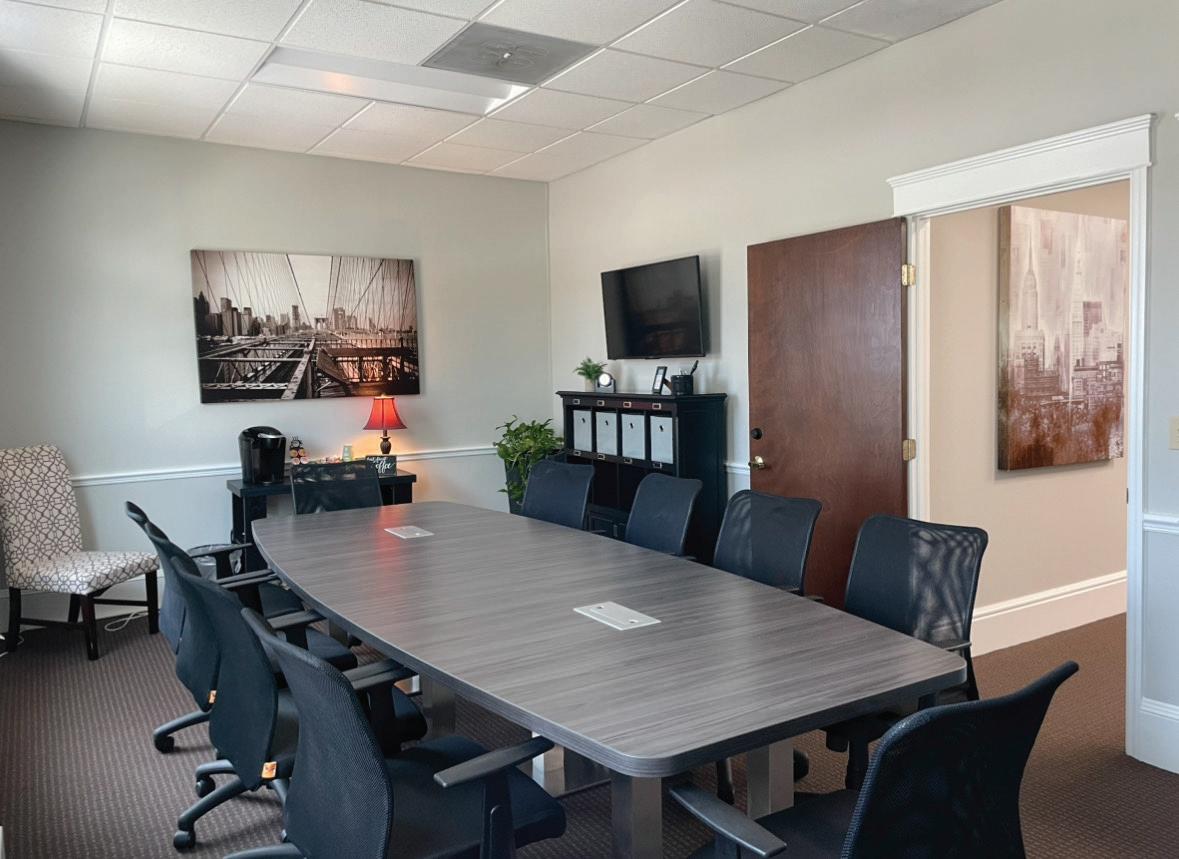
xlsx?rev=4218fe6cad034cd5b60d93 1f71b43fad&hash=285F168441
86F908D3F1A0B2BC86B381 (last visited Jan. 31, 2024).
4. L.E.K Insights, Outlook for the US Dental Industry: Drilling into the Root of the Market, 2022.
5. IBIS World, Latham & Watkins LLP –Company Profile, available at https:// www.ibisworld.com/us/company/ latham-watkins-llp/8611/#:~:text=Latham%20%26%20Watkins%20 LLP%20%2D%20Overview&text=In%20the%20US%2C%20the%20 company,growth%20compared%20 to%20their%20peers (last visited Jan. 31, 2024).
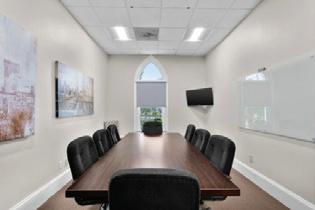


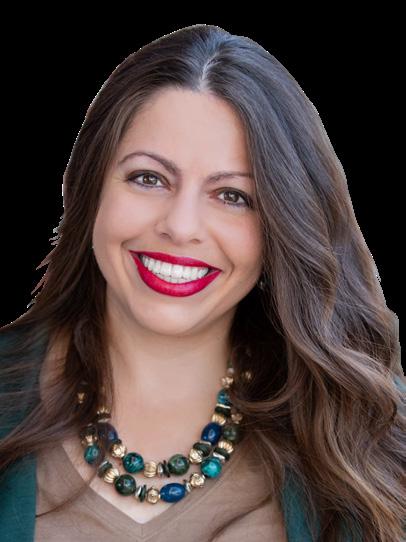
In the bustling legal world of Orlando, Florida, one name stands as a testament to the power of pro bono work - Vanessa Clark, the founder of Clark Law PLLC. Vanessa’s unwavering dedication to providing crucial legal services to those who need them most through her extensive volunteer work with the Legal Aid Society has made her a shining example in the legal community.
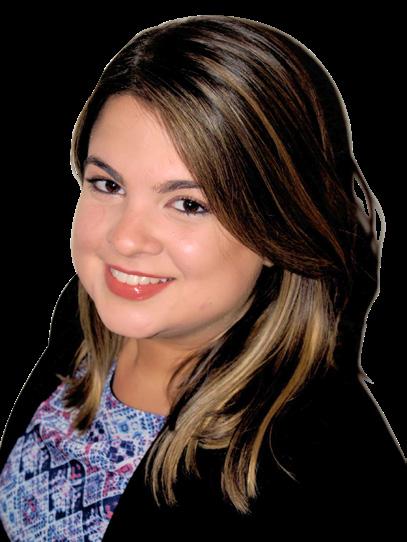
For more information, or if you would like to be a pro bono attorney for the Legal Aid Society, please contact Attorney Laura Sanchez at lsanchez@legalaidocba.org
Should you wish to become a financial donor or help with our fundraising efforts please contact Donna Haynes, Director of Development at (407) 515-1850 or email: dhaynes@legalaidocba.org
Vanessa’s roots trace back to San Juan, Puerto Rico. At the age of five, her family made the move to Orlando, where she pursued her education at the University of Central Florida and later attended Barry Law School.
Vanessa embarked on her pro bono journey in 2012 when she obtained her license to practice law. Since then, she has been actively volunteering her legal expertise to serve her community. Her pro bono work has encompassed a wide range of cases, including serving as a Guardian ad Litem (GAL) to represent the best interests of children caught up in the complexities of the legal system.
One particularly heartwarming chapter of Vanessa’s pro bono journey involved assisting an elderly Spanish woman with her estate plan. Vanessa re-
she actively contributes to the betterment of the legal profession and the broader community.
calls this experience fondly, saying, “Helping this grandma in need and ensuring that her family’s dedication to her was honored was truly fulfilling. She was so grateful. It’s moments like these that remind us why we do pro bono work.”
As Vanessa eloquently puts it, “Serving others is not just a duty; it’s a privilege. It’s about recognizing the immense impact we can make in the lives of those who are less fortunate. Providing legal assistance to those who need it most is a way of giving back and ensuring that justice is accessible to all.”
Vanessa’s commitment to pro bono work extends beyond her legal practice; she also plays an active role in various organizations, including the Hispanic Bar Association of Central Florida. Through her participation in these organizations,
Her dedication to the most vulnerable truly sets Vanessa apart, as does her unwavering advocacy for those who need it most. Whether she’s representing vulnerable children in GAL cases, assisting individuals with their legal challenges, or ensuring that elderly Spanish-speaking clients receive the help they deserve, Vanessa is known for her compassion and fierce advocacy. Her passion for justice and her tireless efforts to ensure that everyone has access to legal representation, make her a valuable asset to the legal community and the people she serves.
Vanessa, like many other Legal Aid pro bono attorneys, is not just empowering the low-income communities she serves, but she is changing the course of the legal field to one of compassion, understanding, and humanity.
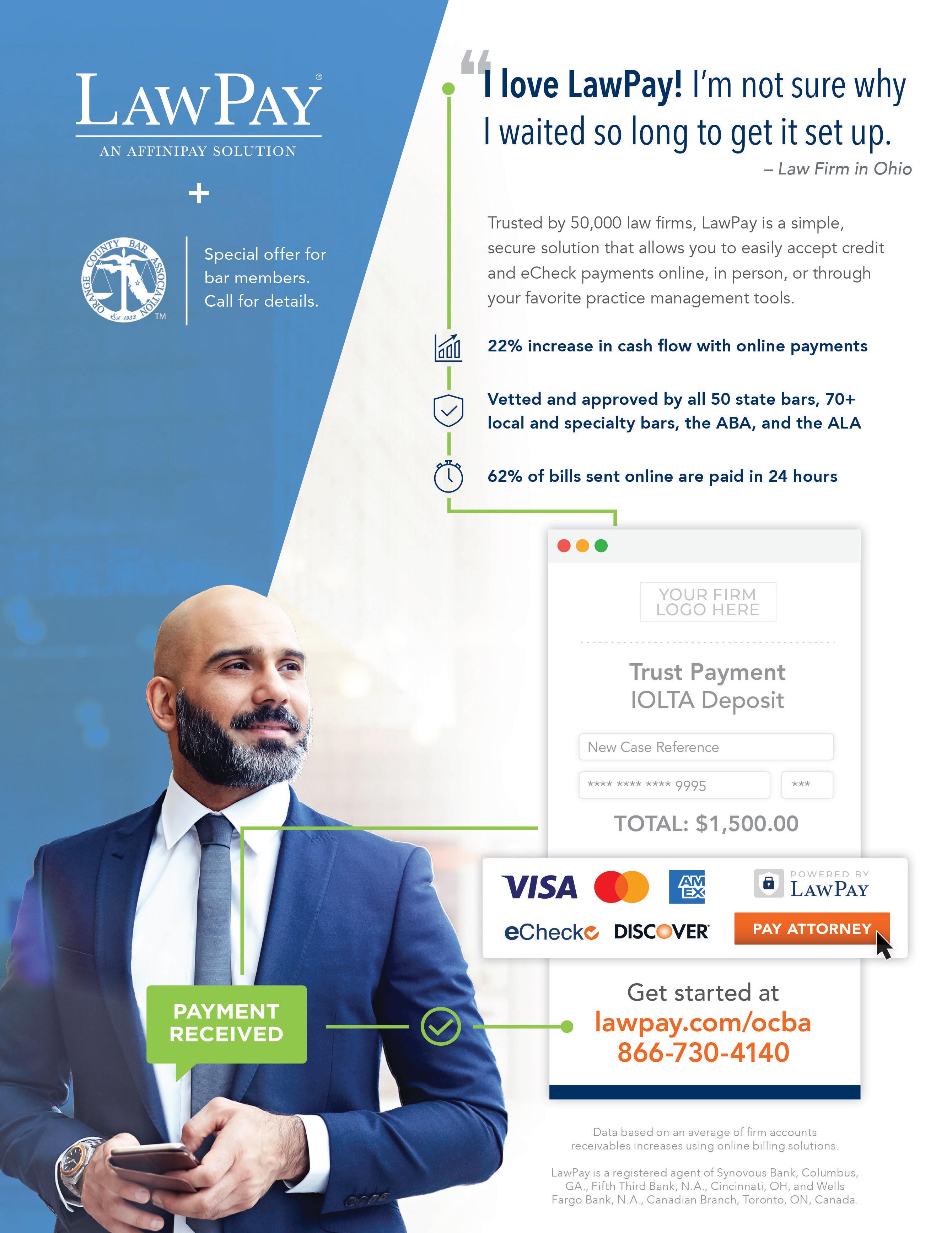
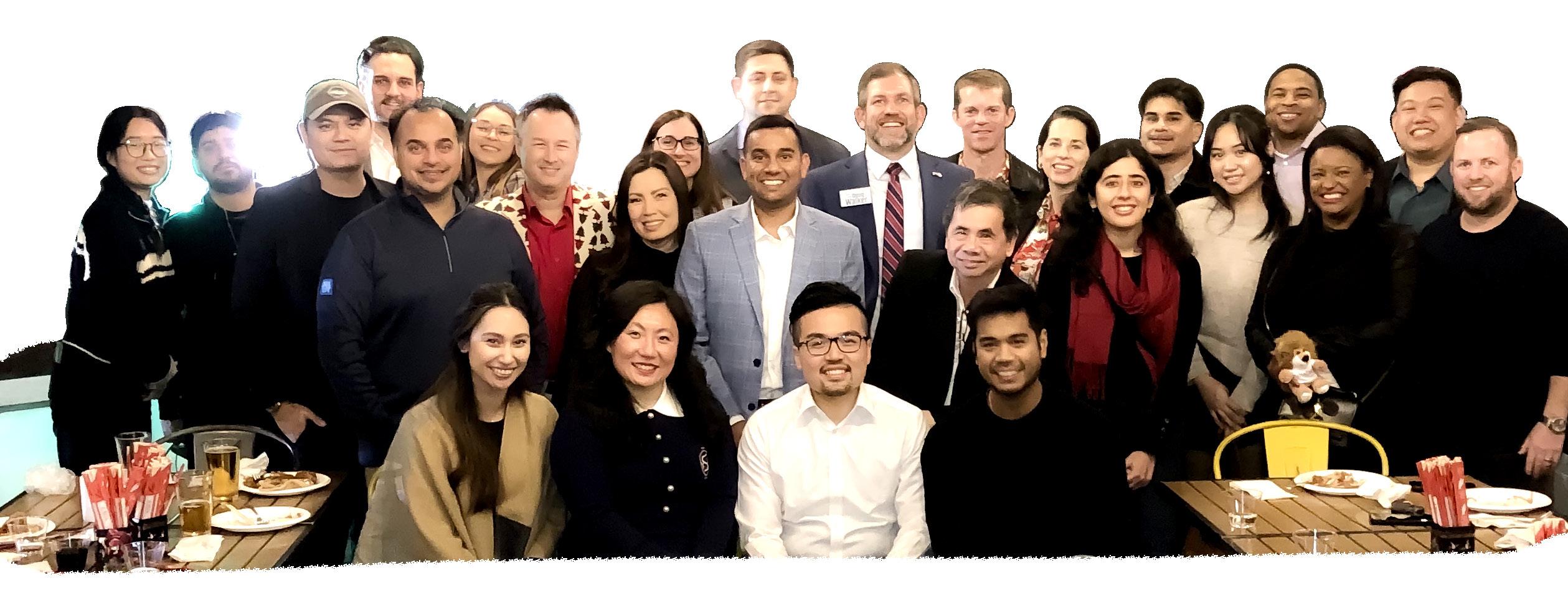
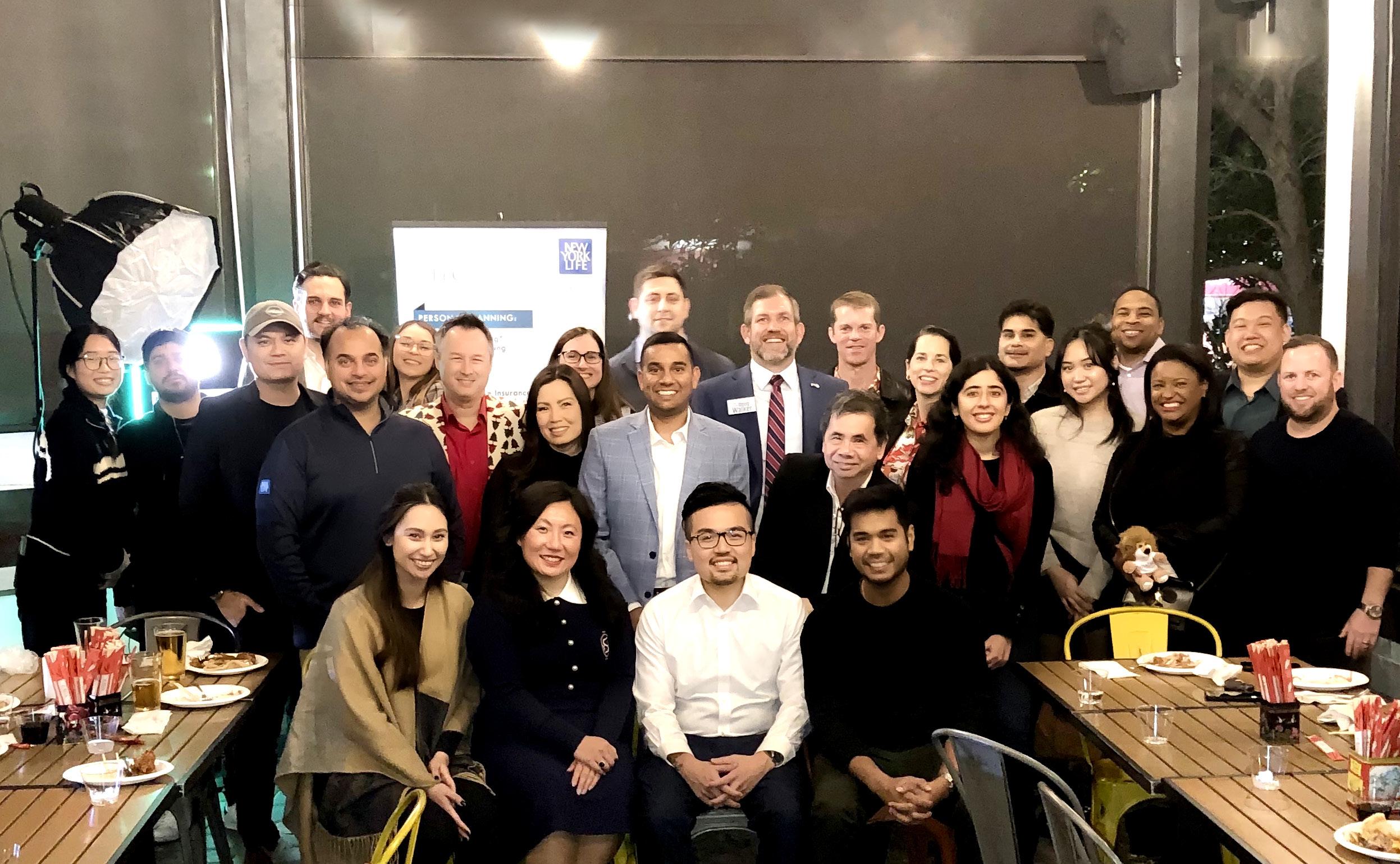
The Greater Orlando Asian American Bar Association (GOAABA)
FEBRUARY 28, 2024 / The Greater Orlando Asian American Bar Association (GOAABA) hosted its Lunar New Year Celebration at Osphere Neighborhood Grill and Bar.
The Hispanic Bar Association of Central Florida
FEBRUARY 6, 2024 / the Hispanic Bar Association of Central Florida hosted a Valentines Day Happy Hour at the Law Office of Corey Cohen.
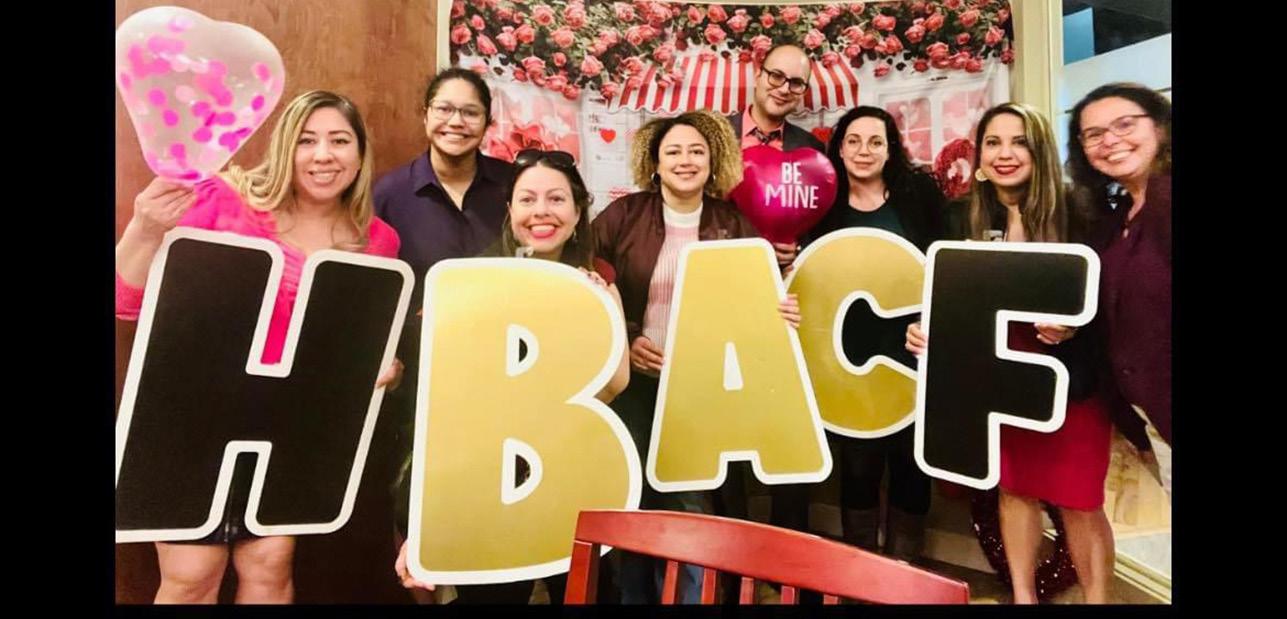
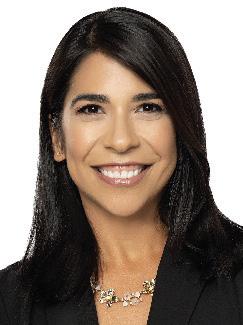
Alena V. Baker, Esq., of Alena Baker Criminal Defense, P.A., is a solo practitioner who practices primarily in the area of criminal law throughout Central Florida. She has been a member of the OCBA since 2011 and is a board member of the Criminal Law Committee of the OCBA.
1 Group picture from GOAABA’s holiday party
2 Hispanic Bar Association of Central Florida Valentines Day Happy Hour
3 Annie Blanc, Jamie Billotte Moses, Sharlene Stanford, Ayana Barrow, Christina Russo Walters, Mary Walter Ingram, Nequosha Anderson, Nicolette Kramer, Alena Baker, The Honorable Celia Dorn
4 January General Body Meeting

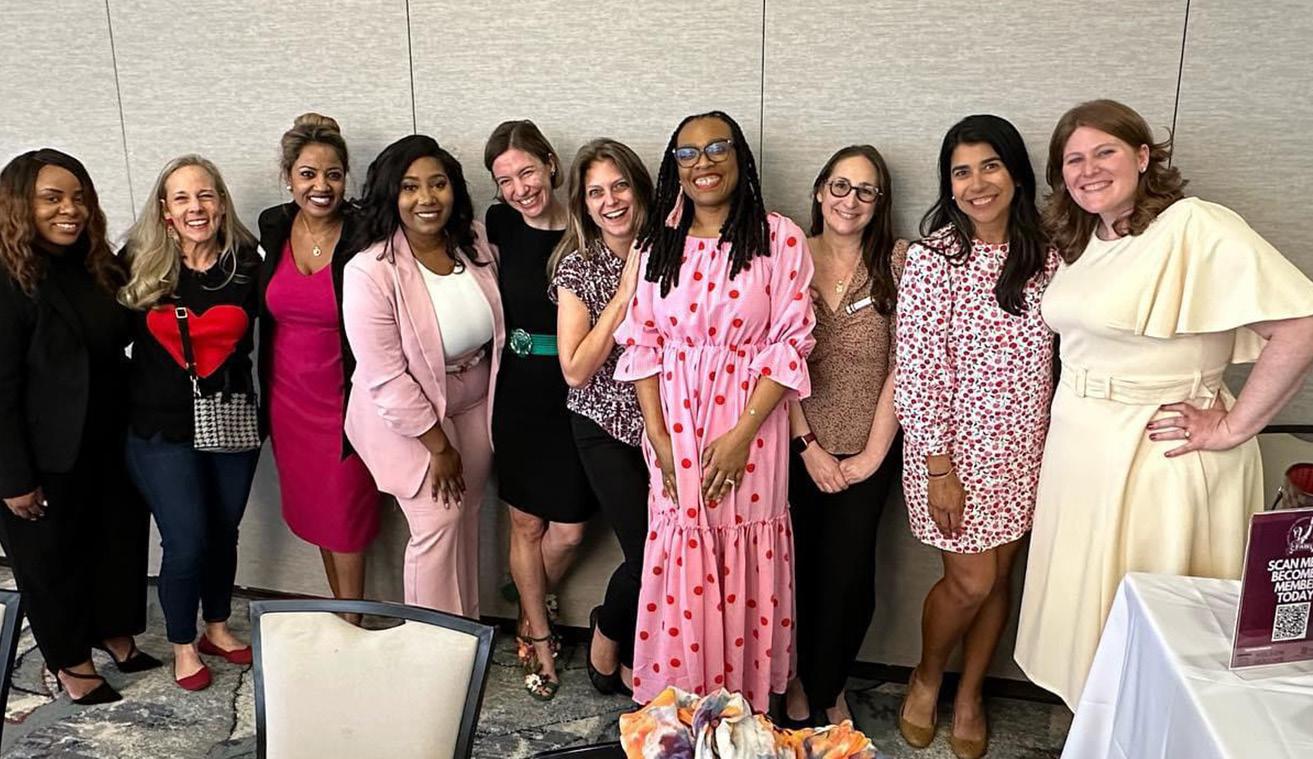
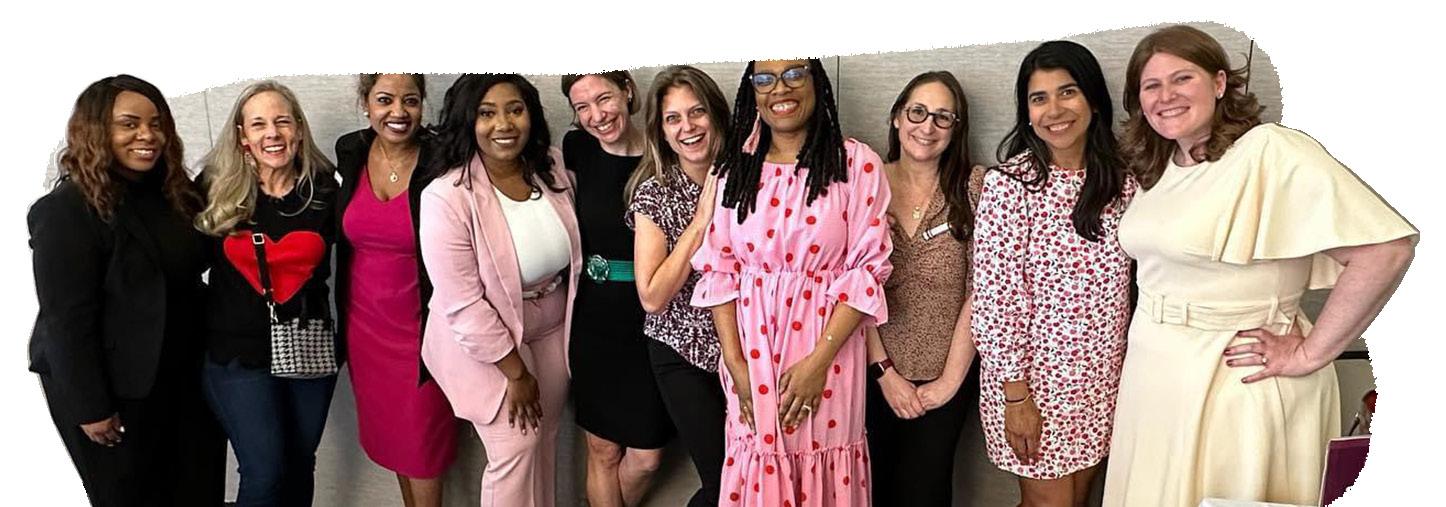
Central Florida Association for Female Lawyers (CFAWL)
The Central Florida Association for Women Lawyers (CFAWL) wishes to congratulate fellow member, The Honorable Celia Dorn, on her appointment to the Osceola County Court.
CFAWL also wishes to share that in February, Annie Blanc, Nequosha Anderson and Ayana Kay had the privilege to present and attend the Florida Bar Young Lawyer’s Division 2024 Affiliate Outreach Conference at Disney where CFAWL was awarded the 2024 Mid-Size Affiliate of the Year from the Florida Bar YLD.
JAN 24 / PCPBA hosted its Annual judicial Reception at Leu Gardens. PCPBA wishes to thank all of the members of the Judiciary who attended the event and do so much for their community.
FEB 8 / CFAWL participated in the 11th annual “Walk a Mile in Her Shoes” event in downtown Orlando and helped raise over �500 in support of Harbor House. The next day on February 9, 2024, CFAWL cohosted a joint luncheon with the Paul C. Perkins Bar Association in celebration of Black History Month.
FEB 18 / CFAWL headed to the Silver Spurs Rodeo in Osceola County and treated the first 25
registered guests to free admission.
FEB 22 / CFAWL attended the FAMU career fair and had a wonderful time interacting and networking with law students.
FEBRUARY / PCPBA helped celebrate Black History Month by having a Black History Month BBQ party hosted by Osborne & Francis Law Firm, PLLC. Also in February, PCPBA volunteered at Ivey Lane Elementary where they hosted a special “Read to a Child” celebration. Thanks to the donations made possible by private donors as well as well as the Florida Bar YLD, every child in first and second grade received a brand-
The Paul C. Perkins Bar Association (PCPBA)
JANUARY 17, 2024 / The Paul C. Perkins Bar Association (PCPBA) hosted its first meeting of the year titled: Pathways to the Bench, Navigating the Judicial Landscape for Judicial Excellence.” PCPBA wishes to thank its panelists: The Honorable Emerson Thompson, The Honorable Reginald Whitehead, The Honorable Embry J. Kidd and Moderator, Natasha Williams, Esq. 4
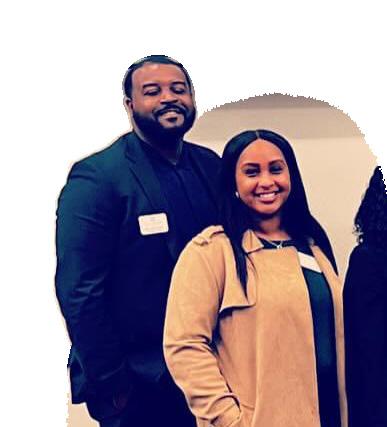
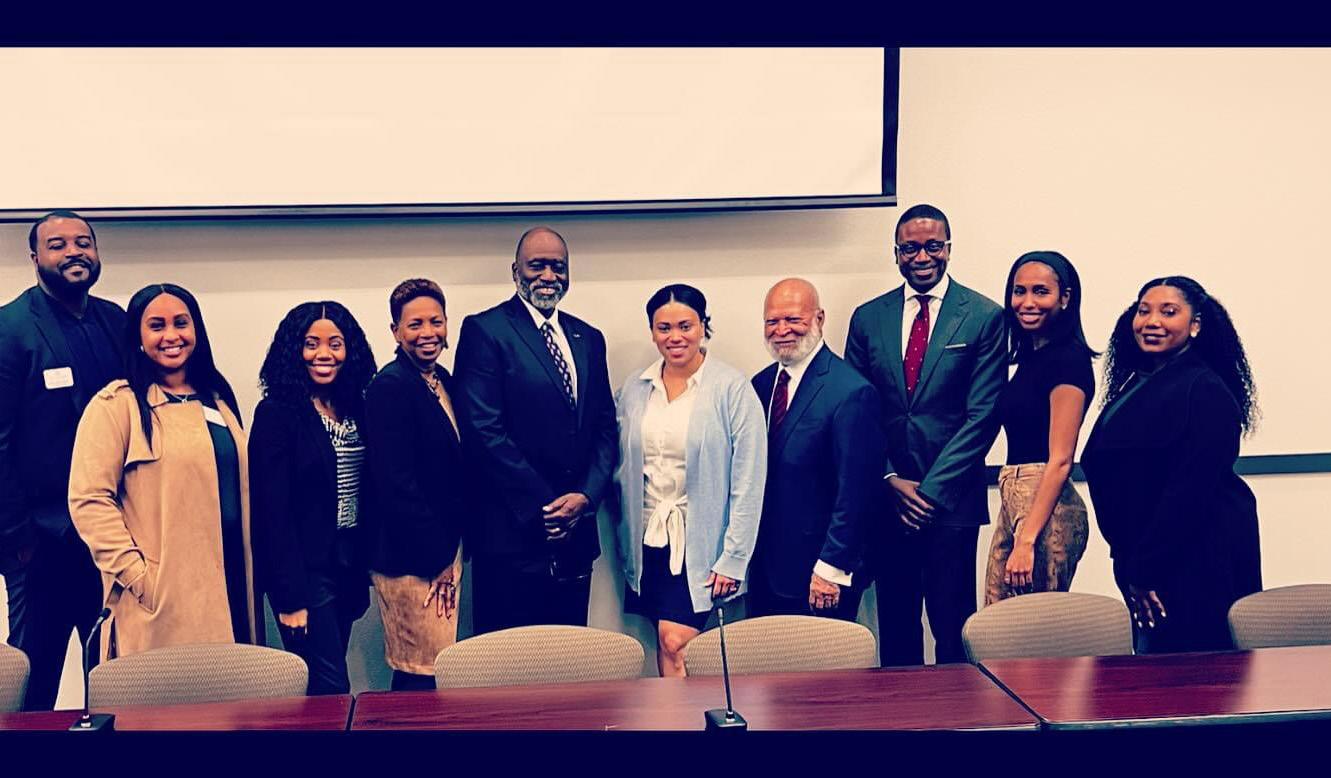
new book with extra books donated to the school library. PCPBA also wishes to thank FAMU Law for donating coloring books as well.
OCTOBER 2023 / The George C. Young American Inns of Court (Inn) kept to their theme of “7 Habits of Happy, Healthy and Hardworking Ethical Professionals” during their October 2023 meeting. As such, the pupillage group presented on time management and productivity. Florida Circuit Judge Vincent Chiu provided Inn members with several tips and tools to help efficiently manage time and get more of the “important” things done. Among the suggestions was implementing the “Pareto Principle,”
otherwise known as the 80/20 Rule, and using the “Eisenhower Matrix” and “Circles of Control” to help evaluate the importance, urgency, and level of control we have over certain tasks, events, and outcomes. The presentation was interactive as attendees were placed into teams and tasked with applying the “Eisenhower Matrix” and “Circles of Control” frameworks to various problems and scenarios. After a discussion of each team’s results, members of the pupillage group engaged in a panel discussion on how they best manage their time and productivity in their dayto-day law practice. Panel members included Sr. U.S. District Judge Roy Dalton, and Attorneys, Kristopher Kest, Charles Greene,
Jennifer Karr, Kenneth, Lineberger, Samendio Mathieu, and Oliva Share. Each panel member shared lessons learned throughout the various phases of their career, which have helped them maximize their productivity.
Finally, Judge Dalton provided his perspective on the importance of time management and being organized, especially in federal court. He explained in detail how he manages his workday, and shared best practices he encourages each of his law clerks to implement. One such practice includes breaking down each day’s tasks into categories such as “must do”, “can do”, and “may do”, and prioritizing accordingly.

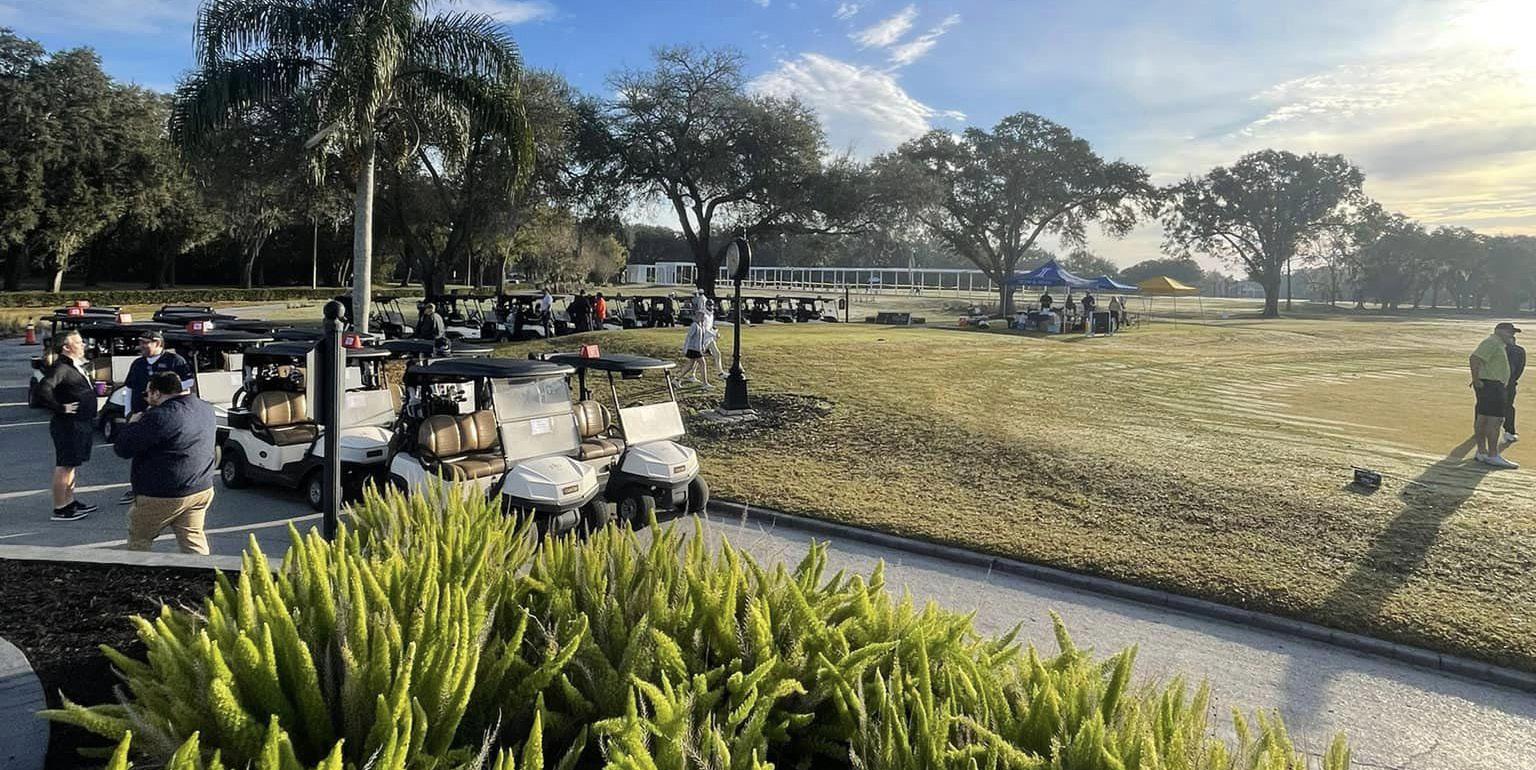
FEBRUARY 2 / YLS Golf Tournament. It was a fantastic day on the green at the Rio Pinar Golf Club! From the shotgun start to the reception lunch and awards that followed, every moment was filled with camaraderie. We work in a stressful profession, and having a day to relax and unwind is so important. It was a day where skill, strategy, and a bit of friendly competition came together beautifully. We can’t wait for the next tournament. The bar has been set high, but we’re excited to see how we can make the next one even more memorable. Stay tuned for more details, and get ready to tee off at another thrilling event!
FEBRUARY 16 / YLS had it’s monthly luncheon! We had a great discussion about the challenges that African American attorneys have faced and continue to face, but also about the progress that we have made. We were honored to have speakers who not only shared their inspiring stories but also illuminated the path forward in our pursuit of diversity, equity, and inclusion in the legal field. Thank you to everyone who attended the luncheon.
FEBRUARY 22 / YLS held its Evening with the Judiciary. It was a unique opportunity for us to engage with esteemed members of the judiciary in a more relaxed setting. Court can just be so formal. The insights shared, the stories told, and the wisdom imparted were invaluable. It’s not every day that we get such a close look at the perspectives and experiences of our respected judges. The event was not only enlightening but also a wonderful chance to network and connect with peers and mentors alike.
MARCH 8, 2024 / YLS Luncheon at the Citrus Club
MARCH 28, 2024 / Pink Party – T.Swift Edition
APRIL 13, 2024 / Wills for Heroes
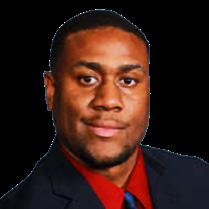
Sean MendezCatlin, Esq., is a founding partner of MC & J Law, PLLC, where he practices business and intellectual property law. He has been a member of OCBA since 2016.
FOLLOW US!
@OCBAYLS
#TogetherWeGoFar
Remember to sign up for the YLS weekly e-mail blast to stay up to date on all of YLS’s exciting events! Just go to www. orangecountybar.org/about/ young-lawyers-section/ and click “Sign Up for YLS Emails.”
Firms with two or more attorneys who are all members can belong! If your firm is eligible, call the Membership Department (407-422-4551 x225)
20+ MEMBERS
Rumberger, Kirk & Caldwell
Shutts & Bowen
Wicker, Smith, O’Hara, et al.
Winderweedle, Haines, et al.
10-19 MEMBERS
Colling Gilbert Wright
Fisher Rushmer
Marshall, Dennehey, Warner, Coleman & Goggin
McDonald Toole Wiggins
Stovash, Case & Tingley
2-9 MEMBERS
The Aikin Family Law Group
Anderson & Ferrin
The Arnold Law Group
Artemis Family Law
Aust Law Firm
Barrister Law Firm
Barry Miller Law
The Brennan Law Firm
Carr Law Firm
Compass Law
Culbertson Law Group
Davey Law Group
Debra Wilkinson Botwin
DeCiccio & Johnson
Dellecker Wilson King
McKenna Ruffier & Sos
Divine & Estes
The Draves Law Firm
The Elder Law Center of Kirson & Fuller
Fassett, Anthony & Taylor
Flammia Elder Law Firm
The Fighter Law Firm
Forward Law Firm
Gasdick Stanton Early GoodBlatt – Leo
Green Family Law
Haliczer Pettis & Schwamm
Harris Harris
Bauerle Lopez
Hilyard, Bogan & Palmer
Hornsby Law
Infocus Family Law Firm
Jill S. Schwartz & Assoc.
Keating & Schlitt
King, Blackwell, Zehnder & Wermuth
Korshak & Assoc.
Kosto & Rotella
Law Offices of Brent C. Miller
Law Offices of Horwitz & Citro
Law Office of Michael L. Dear
Lebron Law
The Llabona Law Group
Marcus & Myers
The Marks Law Firm
McMichen, Cinami & Demps
McShane & McShane
Men’s Divorce Law Firm
Morgan, White-Davis & Martinez
Murphy & Berglund
N. Diane Holmes
O’Mara Law Group
Page & Eichenblatt
Perez LaSure
Rebecca L. Palmer Law Group
Sawyer & Sawyer
Schwam-Wilcox & Assoc.
SeifertMiller
Shannin Law Firm
The Skambis Law Firm
Stovash, Case & Tingley
Tangel-Rodriguez & Assoc.
Warner & Warner
West Family Law Group
Wieland & DeLattre
Wilson McCoy
Wooten Kimbrough
Yergey & Yergey

• Save time starting matters with Recurring Matter Templates.
• Unlock automation by entering details once that pre-populates across matters.
• Access a library of automated, up-to-date, court and government forms.
• Draft all documents and letters directly in LEAP.
• Automate firm-specific documents that are standardized and personalized.






